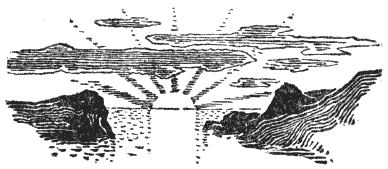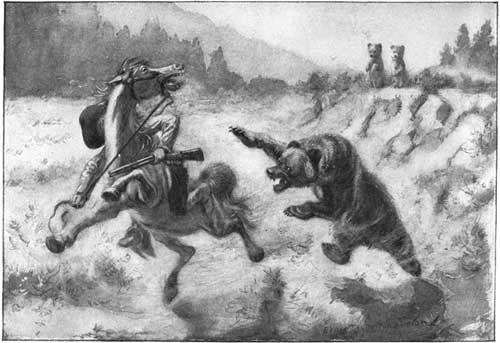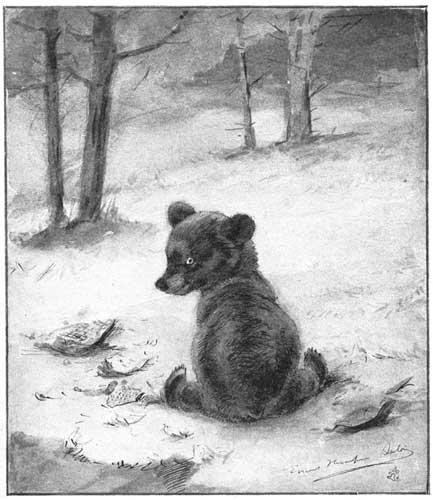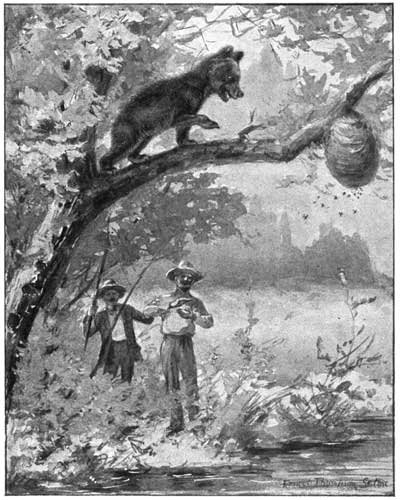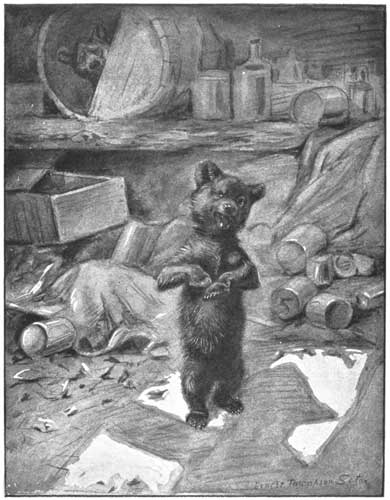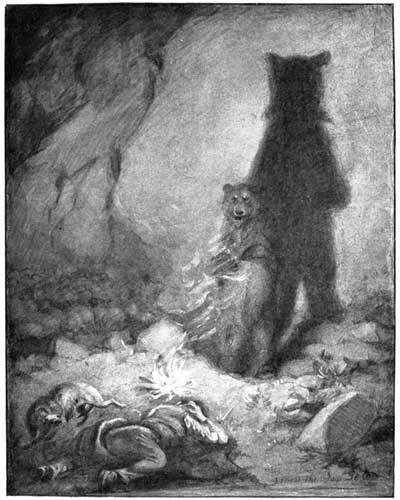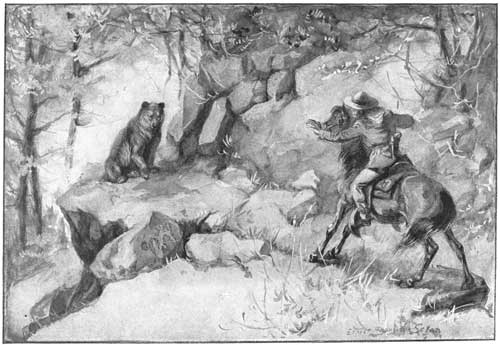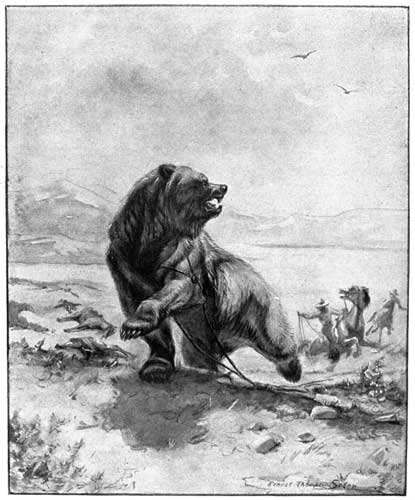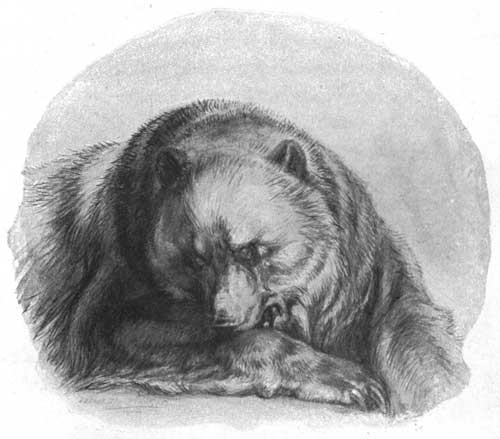MONARCH
The BIG BEAR of Tallac

With 100 Drawings
by Ernest Thompson Seton
Author of
Wild Animals I have known
Trail of the Sandhill Stag
Biography of a Grizzly
Lives of the Hunted.
Two Little Savages. Etc.

Published by Charles Scribner's Sons. New York, 1919.
THIS BOOK IS DEDICATED
To the memory of the days in Tallac's Pines, where by the fire I heard this epic tale.
Kind memory calls the picture up before me now, clear, living clear: I see them as they sat, the one small and slight, the other tall and brawny, leader and led, rough men of the hills. They told me this tale—in broken bits they gave it, a sentence at a time. They were ready to talk but knew not how. Few their words, and those they used would be empty on paper, meaningless without the puckered lip, the interhiss, the brutal semi-snarl restrained by human mastery, the snap and jerk of wrist and gleam of steel-gray eye, that really told the tale, of which the spoken word was mere headline. Another, a subtler theme was theirs that night; not in the line but in the interline it ran; and listening to the hunter's ruder tale, I heard as one may hear the night bird singing in the storm; amid the glitter of the mica I caught the glint of gold, for theirs was a parable of hill-born power that fades when it finds the plains. They told of the giant redwood's growth from a tiny seed; of the avalanche that, born a snowflake, heaves and grows on the peaks, to shrink and die on the level lands below. They told of the river at our feet: of its rise, a thread-like rill, afar on Tallac's side, and its growth—a brook, a stream, a little river, a river, a mighty flood that rolled and ran from hills to plain to meet a final doom so strange that only the wise believe. Yes, I have seen it; it is there to-day—the river, the wonderful river, that unabated flows, but that never reaches the sea.
I give you the story then as it came to me, and yet I do not give it, for theirs is a tongue unknown to script: I give a dim translation; dim, but in all ways respectful, reverencing the indomitable spirit of the mountaineer, worshiping the mighty Beast that nature built a monument of power, and loving and worshiping the clash, the awful strife heroic, at the close, when these two met.
In this Book the designs for
cover, title-page, and general
make-up
were done by
Grace Gallatin Seton.

- "The pony bounded in terror while the Grizzly ran almost alongside"
- "Jack ate till his paunch looked like a rubber balloon"
- 'Honey—Jacky—honey'"
- "Jack ... held up his sticky, greasy arms"
- The Thirty-foot Bear
- "'Now, B'ar, I don't want no scrap with you'"
- "Rumbling and snorting, he made for the friendly hills"
- Monarch
List of The Chapters
- The Two Springs
- The Springs and the Miner's Dam
- The Trout Pool
- The Stream that Sank in the Sand
- The River Held in the Foothills
- The Broken Dam
- The Freshet
- Roaring in the Cañon
- Fire and Water
- The Eddy
- The Ford
- Swirl and Pool and Growing Flood
- The Deepening Channel
- The Cataract
- The Foaming Flood
- Landlocked
—FOREWORD—
The story of Monarch is founded on material gathered from many sources as well as from personal experience, and the Bear is of necessity a composite. The great Grizzly Monarch, still pacing his prison floor at the Golden Gate Park, is the central fact of the tale.
In telling it I have taken two liberties that I conceive to be proper in a story of this sort.
First, I have selected for my hero an unusual individual.
Second, I have ascribed to that one animal the adventures of several of his kind.
The aim of the story is to picture the life of a Grizzly with the added glamour of a remarkable Bear personality. The intention is to convey the known truth. But the fact that liberties have been taken excludes the story from the catalogue of pure science. It must be considered rather an historical novel of Bear life.
Many different Bears were concerned in the early adventures here related, but the last two chapters, the captivity and the despair of the Big Bear, are told as they were told to me by several witnesses, including my friends the two mountaineers.
I. THE TWO SPRINGS
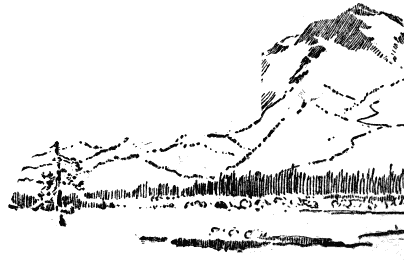
High above Sierra's peaks stands grim Mount Tallac. Ten thousand feet above the sea it rears its head to gaze out north to that vast and wonderful turquoise that men call Lake Tahoe, and northwest, across a piney sea, to its great white sister, Shasta of the Snows; wonderful colors and things on every side, mast-like pine trees strung with jewelry, streams that a Buddhist would have made sacred, hills that an Arab would have held holy. But Lan Kellyan's keen gray eyes were turned to other things. The childish delight in life and light for their own sakes had faded, as they must in one whose training had been to make him hold them very cheap. Why value grass? All the world is grass. Why value air, when it is everywhere in measureless immensity? Why value life, when, all alive, his living came from taking life? His senses were alert, not for the rainbow hills and the gem-bright lakes, but for the living things that he must meet in daily rivalry, each staking on the game, his life. Hunter was written on his leathern garb, on his tawny face, on his lithe and sinewy form, and shone in his clear gray eye.

The cloven granite peak might pass unmarked, but a faint dimple in the sod did not. Calipers could not have told that it was widened at one end, but the hunter's eye did, and following, he looked for and found another, then smaller signs, and he knew that a big Bear and two little ones had passed and were still close at hand, for the grass in the marks was yet unbending. Lan rode his hunting pony on the trail. It sniffed and stepped nervously, for it knew as well as the rider that a Grizzly family was near. They came to a terrace leading to an open upland. Twenty feet on this side of it Lan slipped to the ground, dropped the reins, the well-known sign to the pony that he must stand at that spot, then cocked his rifle and climbed the bank. At the top he went with yet greater caution, and soon saw an old Grizzly with her two cubs. She was lying down some fifty yards away and afforded a poor shot; he fired at what seemed to be the shoulder. The aim was true, but the Bear got only a flesh-wound. She sprang to her feet and made for the place where the puff of smoke arose. The Bear had fifty yards to cover, the man had fifteen, but she came racing down the bank before he was fairly on the horse, and for a hundred yards the pony bounded in terror while the old Grizzly ran almost alongside, striking at him and missing by a scant hair's-breadth each time. But the Grizzly rarely keeps up its great speed for many yards. The horse got under full headway, and the shaggy mother, falling behind, gave up the chase and returned to her cubs.
She was a singular old Bear. She had a large patch of white on her breast, white cheeks and shoulders, graded into the brown elsewhere, and Lan from this remembered her afterward as the "Pinto." She had almost caught him that time, and the hunter was ready to believe that he owed her a grudge.
A week later his chance came. As he passed along the rim of Pocket Gulch, a small, deep valley with sides of sheer rock in most places, he saw afar the old Pinto Bear with her two little brown cubs. She was crossing from one side where the wall was low to another part easy to climb. As she stopped to drink at the clear stream Lan fired with his rifle. At the shot Pinto turned on her cubs, and slapping first one, then the other, she chased them up a tree. Now a second shot struck her and she charged fiercely up the sloping part of the wall, clearly recognizing the whole situation and determined to destroy that hunter. She came snorting up the steep acclivity wounded and raging, only to receive a final shot in the brain that sent her rolling back to lie dead at the bottom of Pocket Gulch. The hunter, after waiting to make sure, moved to the edge and fired another shot into the old one's body; then reloading, he went cautiously down to the tree where still were the cubs. They gazed at him with wild seriousness as he approached them, and when he began to climb they scrambled up higher. Here one set up a plaintive whining and the other an angry growling, their outcries increasing as he came nearer.
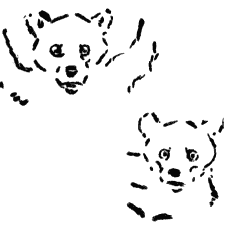
He took out a stout cord, and noosing them in turn, dragged them to the ground. One rushed at him and, though little bigger than a cat, would certainly have done him serious injury had he not held it off with a forked stick.

After tying them to a strong but swaying branch he went to his horse, got a grain-bag, dropped them into that, and rode with them to his shanty. He fastened each with a collar and chain to a post, up which they climbed, and sitting on the top they whined and growled, according to their humor. For the first few days there was danger of the cubs strangling themselves or of starving to death, but at length they were beguiled into drinking some milk most ungently procured from a range cow that was lassoed for the purpose. In another week they seemed somewhat reconciled to their lot, and thenceforth plainly notified their captor whenever they wanted food or water.
And thus the two small rills ran on, a little farther down the mountain now, deeper and wider, keeping near each other; leaping bars, rejoicing in the sunlight, held for a while by some trivial dam, but overleaping that and running on with pools and deeps that harbor bigger things.
II. THE SPRINGS AND THE MINER'S DAM

Jack and Jill, the hunter named the cubs; and Jill, the little fury, did nothing to change his early impression of her bad temper. When at food-time the man came she would get as far as possible up the post and growl, or else sit in sulky fear and silence; Jack would scramble down and strain at his chain to meet his captor, whining softly, and gobbling his food at once with the greatest of gusto and the worst of manners. He had many odd ways of his own, and he was a lasting rebuke to those who say an animal has no sense of humor. In a month he had grown so tame that he was allowed to run free. He followed his master like a dog, and his tricks and funny doings were a continual delight to Kellyan and the few friends he had in the mountains.
On the creek-bottom below the shack was a meadow where Lan cut enough hay each year to feed his two ponies through the winter. This year when hay-time came Jack was his daily companion, either following him about in dangerous nearness to the snorting scythe, or curling up an hour at a time on his coat to guard it assiduously from such aggressive monsters as Ground Squirrels and Chipmunks. An interesting variation of the day came about whenever the mower found a bumblebees' nest. Jack loved honey, of course, and knew quite well what a bees' nest was, so the call, "Honey—Jacky—honey!" never failed to bring him in waddling haste to the spot. Jerking his nose up in token of pleasure, he would approach cautiously, for he knew that bees have stings. Watching his chance, he would dexterously slap at them with his paws till, one by one, they were knocked down and crushed; then sniffing hard for the latest information, he would stir up the nest gingerly till the very last was tempted forth to be killed. When the dozen or more that formed the swarm were thus got rid of, Jack would carefully dig out the nest and eat first the honey, next the grubs and wax, and last of all the bees he had killed, champing his jaws like a little Pig at a trough, while his long red, snaky tongue was ever busy lashing the stragglers into his greedy maw.
Lan's nearest neighbor was Lou Bonamy, an ex-cowboy and sheep-herder, now a prospecting miner. He lived, with his dog, in a shanty about a mile below Kellyan's shack. Bonamy had seen Jack "perform on a bee-crew." And one day, as he came to Kellyan's, he called out: "Lan, bring Jack here and we'll have some fun." He led the way down the stream into the woods. Kellyan followed him, and Jacky waddled at Kellyan's heels, sniffing once in a while to make sure he was not following the wrong pair of legs.

"There, Jacky, honey—honey!" and Bonamy pointed up a tree to an immense wasps' nest.
Jack cocked his head on one side and swung his nose on the other. Certainly those things buzzing about looked like bees, though he never before saw a bees' nest of that shape, or in such a place.
But he scrambled up the trunk. The men waited—Lan in doubt as to whether he should let his pet cub go into such danger, Bonamy insisting it would be a capital joke "to spring a surprise" on the little Bear. Jack reached the branch that held the big nest high over the deep water, but went with increasing caution. He had never seen a bees' nest like this; it did not have the right smell. Then he took another step forward on the branch—what an awful lot of bees; another step—still they were undoubtedly bees; he cautiously advanced a foot—and bees mean honey; a little farther—he was now within four feet of the great paper globe. The bees hummed angrily and Jack stepped back, in doubt. The men giggled; then Bonamy called softly and untruthfully: "Honey—Jacky—honey!"

The little Bear, fortunately for himself, went slowly, since in doubt; he made no sudden move, and he waited a long time, though urged to go on, till the whole swarm of bees had reentered their nest. Now Jacky jerked his nose up, hitched softly out a little farther till right over the fateful paper globe. He reached out, and by lucky chance put one horny little paw-pad over the hole; his other arm grasped the nest, and leaping from the branch he plunged headlong into the pool below, taking the whole thing with him. As soon as he reached the water his hind feet were seen tearing into the nest, kicking it to pieces; then he let it go and struck out for the shore, the nest floating in rags down-stream. He ran alongside till the comb lodged against a shallow place, then he plunged in again; the wasps were drowned or too wet to be dangerous, and he carried his prize to the bank in triumph. No honey; of course, that was a disappointment, but there were lots of fat white grubs—almost as good—and Jack ate till his paunch looked like a little rubber balloon.
"How is that?" chuckled Lan.
"The laugh is on us," answered Bonamy, with a grimace.
III. THE TROUT POOL
Jack was now growing into a sturdy cub, and he would follow Kellyan even as far as Bonamy's shack. One day, as they watched him rolling head over heels in riotous glee, Kellyan remarked to his friend: "I'm afraid some one will happen on him an' shoot him in the woods for a wild B'ar."
"Then why don't you ear-mark him with them thar new sheep-rings?" was the sheep-man's suggestion.
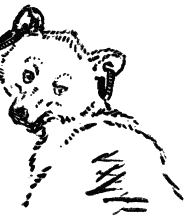
Thus it was that, much against his will, Jack's ears were punched and he was decorated with earrings like a prize ram. The intention was good, but they were neither ornamental nor comfortable. Jack fought them for days, and when at length he came home trailing a branch that was caught in the jewel of his left ear, Kellyan impatiently removed them.
At Bonamy's he formed two new acquaintances, a blustering, bullying old ram that was "in storage" for a sheep-herder acquaintance, and which inspired him with a lasting enmity for everything that smelt of sheep—and Bonamy's dog.
This latter was an active, yapping, unpleasant cur that seemed to think it rare fun to snap at Jacky's heels, then bound out of reach. A joke is a joke, but this horrid beast did not know where to stop, and Jack's first and second visits to the Bonamy hut were quite spoiled by the tyranny of the dog. If Jack could have got hold of him he might have settled the account to his own satisfaction, but he was not quick enough for that. His only refuge was up a tree. He soon discovered that he was happier away from Bonamy's, and thenceforth when he saw his protector take the turn that led to the miner's cabin, Jack said plainly with a look, "No, thank you," and turned back to amuse himself at home.
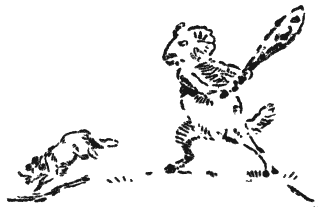
His enemy, however, often came with Bonamy to the hunter's cabin, and there resumed his amusement of teasing the little Bear. It proved so interesting a pursuit that the dog learned to come over on his own account whenever he felt like having some fun, until at length Jack was kept in continual terror of the yellow cur. But it all ended very suddenly.
One hot day, while the two men smoked in front of Kellyan's house, the dog chased Jack up a tree and then stretched himself out for a pleasant nap in the shade of its branches. Jack was forgotten as the dog slumbered. The little Bear kept very quiet for a while, then, as his twinkling brown eyes came back to that hateful dog, that he could neither catch nor get away from, an idea seemed to grow in his small brain. He began to move slowly and silently down the branch until he was over the foe, slumbering, twitching his limbs, and making little sounds that told of dreams of the chase, or, more likely, dreams of tormenting a helpless Bear cub. Of course, Jack knew nothing of that. His one thought, doubtless, was that he hated that cur and now he could vent his hate. He came just over the tyrant, and taking careful aim, he jumped and landed squarely on the dog's ribs. It was a terribly rude awakening, but the dog gave no yelp, for the good reason that the breath was knocked out of his body. No bones were broken, though he was barely able to drag himself away in silent defeat, while Jacky played a lively tune on his rear with paws that were fringed with meat-hooks.
Evidently it was a most excellent plan; and when the dog came around after that, or when Jack went to Bonamy's with his master, as he soon again ventured to do, he would scheme with more or less success to "get the drop on the purp," as the men put it. The dog now rapidly lost interest in Bear-baiting, and in a short time it was a forgotten sport.
IV. THE STREAM THAT SANK IN THE SAND
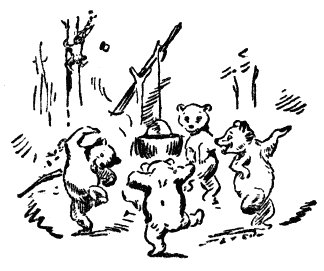

Jack was funny; Jill was sulky. Jack was petted and given freedom, so grew funnier; Jill was beaten and chained, so grew sulkier. She had a bad name and she was often punished for it; it is usually so.
One day, while Lan was away, Jill got free and joined her brother. They broke into the little storehouse and rioted among the provisions. They gorged themselves with the choicest sorts; and the common stuffs, like flour, butter, and baking-powder, brought fifty miles on horseback, were good enough only to be thrown about the ground or rolled in. Jack had just torn open the last bag of flour, and Jill was puzzling over a box of miner's dynamite, when the doorway darkened and there stood Kellyan, a picture of amazement and wrath. Little Bears do not know anything about pictures, but they have some acquaintance with wrath. They seemed to know that they were sinning, or at least in danger, and Jill sneaked, sulky and snuffy, into a dark corner, where she glared defiantly at the hunter. Jack put his head on one side, then, quite forgetful of all his misbehavior, he gave a delighted grunt, and scuttling toward the man, he whined, jerked his nose, and held up his sticky, greasy arms to be lifted and petted as though he were the best little Bear in the world.
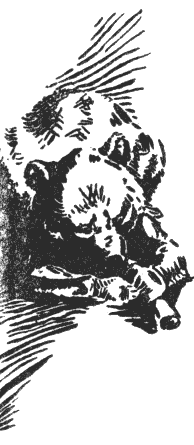
Alas, how likely we are to be taken at our own estimate! The scowl faded from the hunter's brow as the cheeky and deplorable little Bear began to climb his leg. "You little divil," he growled, "I'll break your cussed neck"; but he did not. He lifted the nasty, sticky little beast and fondled him as usual, while Jill, no worse—even more excusable, because less trained—suffered all the terrors of his wrath and was double-chained to the post, so as to have no further chance of such ill-doing.
This was a day of bad luck for Kellyan. That morning he had fallen and broken his rifle. Now, on his return home, he found his provisions spoiled, and a new trial was before him.
A stranger with a small pack-train called at his place that evening and passed the night with him. Jack was in his most frolicsome mood and amused them both with tricks half-puppy and half-monkey like, and in the morning, when the stranger was leaving, he said: "Say, pard, I'll give you twenty-five dollars for the pair." Lan hesitated, thought of the wasted provisions, his empty purse, his broken rifle, and answered: "Make it fifty and it's a go."
"Shake on it."
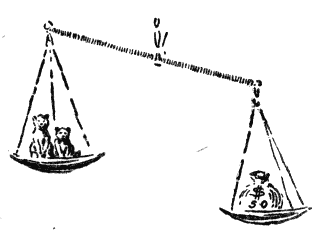
So the bargain was made, the money paid, and in fifteen minutes the stranger was gone with a little Bear in each pannier of his horse.
Jill was surly and silent; Jack kept up a whining that smote on Lan's heart with a reproachful sound, but he braced himself with, "Guess they're better out of the way; couldn't afford another storeroom racket," and soon the pine forest had swallowed up the stranger, his three led horses, and the two little Bears.
"Well, I'm glad he's gone," said Lan, savagely, though he knew quite well that he was already scourged with repentance. He began to set his shanty in order. He went to the storehouse and gathered the remnants of the provisions. After all, there was a good deal left. He walked past the box where Jack used to sleep. How silent it was! He noted the place where Jack used to scratch the door to get into the cabin, and started at the thought that he should hear it no more, and told himself, with many cuss-words, that he was "mighty glad of it." He pottered about, doing—doing—oh, anything, for an hour or more; then suddenly he leaped on his pony and raced madly down the trail on the track of the stranger. He put the pony hard to it, and in two hours he overtook the train at the crossing of the river.
"Say, pard, I done wrong. I didn't orter sell them little B'ars, leastwise not Jacky. I—I—wall, now, I want to call it off. Here's yer yellow."
"I'm satisfied with my end of it," said the stranger, coldly.
"Well, I ain't," said Lan, with warmth, "an' I want it off."
"Ye're wastin' time if that's what ye come for," was the reply.
"We'll see about that," and Lan threw the gold pieces at the rider and walked over toward the pannier, where Jack was whining joyfully at the sound of the familiar voice.
"Hands up," said the stranger, with the short, sharp tone of one who had said it before, and Lan turned to find himself covered with a .45 navy Colt.
"Ye got the drop on me," he said; "I ain't got no gun; but look-a here, stranger, that there little B'ar is the only pard I got; he's my stiddy company an' we're almighty fond o' each other. I didn't know how much I was a-goin' to miss him. Now look-a here: take back yer fifty; ye give me Jack an' keep Jill."
"If ye got five hundred cold plunks in yaller ye kin get him; if not, you walk straight to that tree thar an' don't drop yer hands or turn or I'll fire. Now start."
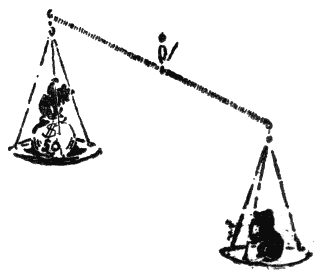
Mountain etiquette is very strict, and Lan, being without weapons, must needs obey the rules. He marched to the distant tree under cover of the revolver. The wail of little Jack smote painfully on his ear, but he knew the ways of the mountaineers too well to turn or make another offer, and the stranger went on.
Many a man has spent a thousand dollars in efforts to capture some wild thing and felt it worth the cost—for a time. Then he is willing to sell it for half cost, then for quarter, and at length he ends by giving it away. The stranger was vastly pleased with his comical Bear cubs at first, and valued them proportionately; but each day they seemed more troublesome and less amusing, so that when, a week later, at the Bell-Cross Ranch, he was offered a horse for the pair, he readily closed, and their days of hamper-travel were over.
The owner of the ranch was neither mild, refined, nor patient. Jack, good-natured as he was, partly grasped these facts as he found himself taken from the pannier, but when it came to getting cranky little Jill out of the basket and into a collar, there ensued a scene so unpleasant that no collar was needed. The ranchman wore his hand in a sling for two weeks, and Jacky at his chain's end paced the ranch-yard alone.

V. THE RIVER HELD IN THE FOOTHILLS
There was little of pleasant interest in the next eighteen months of Jack's career. His share of the globe was a twenty-foot circle around a pole in the yard. The blue hills of the offing, the nearer pine grove, and even the ranch-house itself were fixed stars, far away and sending merely faint suggestions of their splendors to his not very bright eyes. Even the horses and men were outside his little sphere and related to him about as much as comets are to the earth. The very tricks that had made him valued were being forgotten as Jack grew up in chains.
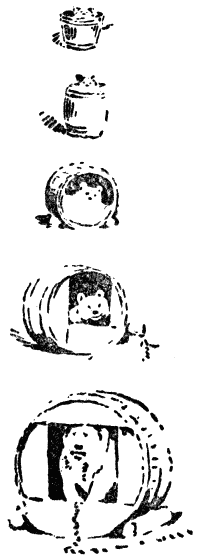
At first a butter-firkin had made him an ample den, but he rapidly passed through the various stages—butter-firkin, nail-keg, flour-barrel, oil-barrel—and had now to be graded as a good average hogshead Bear, though he was far from filling that big round wooden cavern that formed his latest den.
The ranch hotel lay just where the foothills of the Sierras with their groves of live oaks were sloping into the golden plains of the Sacramento. Nature had showered on it every wonderful gift in her lap. A foreground rich with flowers, luxuriant in fruit, shade and sun, dry pastures, rushing rivers, and murmuring rills, were here. Great trees were variants of the view, and the high Sierras to the east overtopped the wondrous plumy forests of their pines with blocks of sculptured blue. Back of the house was a noble river of water from the hills, fouled and chained by sluice and dam, but still a noble stream whose earliest parent rill had gushed from grim old Tallac's slope.
Things of beauty, life, and color were on every side, and yet most sordid of the human race were the folk about the ranch hotel. To see them in this setting might well raise doubt that any "rise from Nature up to Nature's God." No city slum has ever shown a more ignoble crew, and Jack, if his mind were capable of such things, must have graded the two-legged ones lower in proportion as he knew them better.
Cruelty was his lot, and hate was his response. Almost the only amusing trick he now did was helping himself to a drink of beer. He was very fond of beer, and the loafers about the tavern often gave him a bottle to see how dexterously he would twist off the wire and work out the cork. As soon as it popped, he would turn it up between his paws and drink to the last drop.
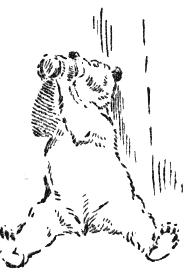
The monotony of his life was occasionally varied with a dog fight. His tormentors would bring their Bear dogs "to try them on the cub." It seemed to be very pleasant sport to men and dogs, till Jack learned how to receive them. At first he used to rush furiously at the nearest tormentor until brought up with a jerk at the end of his chain and completely exposed to attack behind from another dog. A month or two entirely changed his method. He learned to sit against the hogshead and quietly watch the noisy dogs around him, with much show of inattention, making no move, no matter how near they were, until they "bunched," that is, gathered in one place. Then he charged. It was inevitable that the hind dogs would be the last to jump, and so hindered the front ones; thus Jack would "get" one or more of them, and the game became unpopular.
When about eighteen months old, and half grown, an incident took place which defied all explanation. Jack had won the name of being dangerous, for he had crippled one man with a blow and nearly killed a tipsy fool who volunteered to fight him. A harmless but good-for-nothing sheep-herder who loafed about the place got very drunk one night and offended some fire-eaters. They decided that, as he had no gun, it would be the proper thing to club him to their hearts' content instead of shooting him full of holes, in the manner usually prescribed by their code. Faco Tampico made for the door and staggered out into the darkness. His pursuers were even more drunk, but, bent on mischief, they gave chase, and Faco dodged back of the house and into the yard. The mountaineers had just wit enough to keep out of reach of the Grizzly as they searched about for their victim, but they did not find him. Then they got torches, and making sure that he was not in the yard, were satisfied that he had fallen into the river behind the barn and doubtless was drowned. A few rude jokes, and they returned to the house. As they passed the Grizzly's den their lanterns awoke in his eyes a glint of fire. In the morning the cook, beginning his day, heard strange sounds in the yard. They came from the Grizzly's den: "Hyar, you, lay over dahr," in sleepy tones; then a deep, querulous grunting.
The cook went as close as he dared and peeped in. Said the same voice in sleepy tones: "Who are ye crowding, caramba!" and a human elbow was seen jerking and pounding; and again impatient growling in bear-like tones was the response.
The sun came up and the astonished loafers found it was the missing sheep-herder that was in the Bear's den, calmly sleeping off his debauch in the very cave of death. The men tried to get him out, but the Grizzly plainly showed that they could do so only over his dead body. He charged with vindictive fury at any who ventured near, and when they gave up the attempt he lay down at the door of the den on guard. At length the sheep-herder came to himself, rose up on his elbows, and realizing that he was in the power of the young Grizzly, he stepped gingerly over his guardian's back and ran off without even saying "Thank you."
The Fourth of July was at hand now, and the owner of the tavern, growing weary of the huge captive in the yard, announced that he would celebrate Independence Day with a grand fight between a "picked and fighting range bull and a ferocious Californian Grizzly." The news was spread far and wide by the "Grapevine Telegraph." The roof of the stable was covered with seats at fifty cents each. The hay-wagon was half loaded and drawn alongside the corral; seats here gave a perfect view and were sold at a dollar apiece. The old corral was repaired, new posts put in where needed, and the first thing in the morning a vicious old bull was herded in and tormented till he was "snuffy" and extremely dangerous.
Jack meanwhile had been roped, "choked down," and nailed up in his hogshead. His chain and collar were permanently riveted together, so the collar was taken off, as "it would be easy to rope him, if need be, after the bull was through with him."
The hogshead was rolled over to the corral gate and all was ready.
The cowboys came from far and near in their most gorgeous trappings, and the California cowboy is the peacock of his race. Their best girls were with them, and farmers and ranchmen came for fifty miles to enjoy the Bull-and-Bear fight. Miners from the hills were there, Mexican sheep-herders, storekeepers from Placerville, strangers from Sacramento; town and county, mountain and plain, were represented. The hay-wagon went so well that another was brought into market. The barn roof was sold out. An ominous crack of the timbers somewhat shook the prices, but a couple of strong uprights below restored the market, and all "The Corners" was ready and eager for the great fight. Men who had been raised among cattle were betting on the bull.
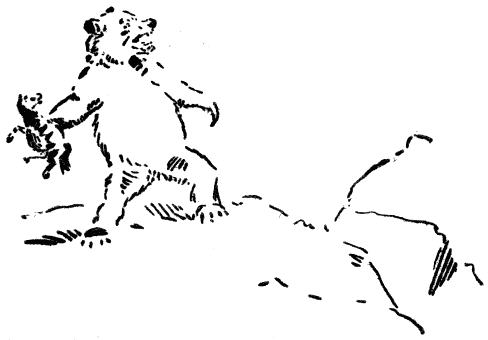
"I tell you, there ain't nothing on earth kin face a big range bull that hez good use of hisself."
But the hillmen were backing the Bear. "Pooh, what's a bull to a Grizzly? I tell you, I seen a Grizzly send a horse clean over the Hetch-Hetchy with one clip of his left. Bull! I'll bet he'll never show up in the second round."
So they wrangled and bet, while burly women, trying to look fetching, gave themselves a variety of airs, were "scared at the whole thing, nervous about the uproar, afraid it would be shocking," but really were as keenly interested as the men.
All was ready, and the boss of "The Corners" shouted: "Let her go, boys; house is full an' time's up!"
Faco Tampico had managed to tie a bundle of chaparral thorn to the bull's tail, so that the huge creature had literally lashed himself into a frenzy.
Jack's hogshead meanwhile had been rolled around till he was raging with disgust, and Faco, at the word of command, began to pry open the door. The end of the barrel was close to the fence, the door cleared away; now there was nothing for Jack to do but to go forth and claw the bull to pieces. But he did not go. The noise, the uproar, the strangeness of the crowd affected him so that he decided to stay where he was, and the bull-backers raised a derisive cry. Their champion came forward bellowing and sniffing, pausing often to paw the dust. He held his head very high and approached slowly until he came within ten feet of the Grizzly's den; then, giving a snort, he turned and ran to the other end of the corral. Now it was the Bear-backers' turn to shout.
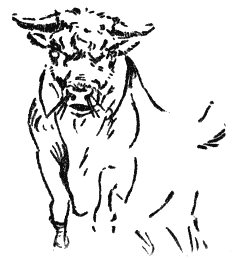
But the crowd wanted a fight, and Faco, forgetful of his debt to Grizzly Jack, dropped a bundle of Fourth of July crackers into the hogshead by way of the bung. "Crack!" and Jack jumped up. "Fizz—crack—c-r-r-r-a-a-c-k, cr-k-crk-ck!" and Jack in surprise rushed from his den into the arena. The bull was standing in a magnificent attitude there in the middle, but when he saw the Bear spring toward him, he gave two mighty snorts and retreated as far as he could, amid cheers and hisses.
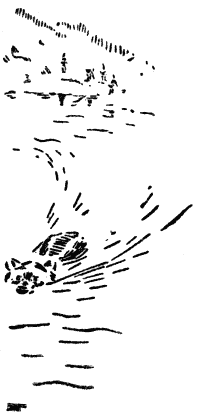
Perhaps the two main characteristics of the Grizzly are the quickness with which he makes a plan and the vigor with which he follows it up. Before the bull had reached the far side of the corral Jack seemed to know the wisest of courses. His pig-like eyes swept the fence in a flash—took in the most climbable part, a place where a cross-piece was nailed on in the middle. In three seconds he was there, in two seconds he was over, and in one second he dashed through the running, scattering mob and was making for the hills as fast as his strong and supple legs could carry him. Women screamed, men yelled, and dogs barked; there was a wild dash for the horses tied far from the scene of the fight, to spare their nerves, but the Grizzly had three hundred yards' start, five hundred yards even, and before the gala mob gave out a long and flying column of reckless, riotous riders, the Grizzly had plunged into the river, a flood no dog cared to face, and had reached the chaparral and the broken ground in line for the piney hills. In an hour the ranch hotel, with its galling chain, its cruelties, and its brutal human beings, was a thing of the past, shut out by the hills of his youth, cut off by the river of his cub-hood, the river grown from the rill born in his birthplace away in Tallac's pines. That Fourth of July was a glorious Fourth—it was Independence Day for Grizzly Jack.
VI. THE BROKEN DAM
A wounded deer usually works downhill, a hunted Grizzly climbs. Jack knew nothing of the country, but he did know that he wanted to get away from that mob, so he sought the roughest ground, and climbed and climbed.
He had been alone for hours, traveling up and on. The plain was lost to view. He was among the granite rocks, the pine trees, and the berries now, and he gathered in food from the low bushes with dexterous paws and tongue as he traveled, but stopped not at all until among the tumbled rock, where the sun heat of the afternoon seemed to command rather than invite him to rest.
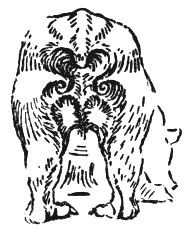
The night was black when he awoke, but Bears are not afraid of the dark—they rather fear the day—and he swung along, led, as before, by the impulse to get up above the danger; and thus at last he reached the highest range, the region of his native Tallac.
He had but little of the usual training of a young Bear, but he had a few instincts, his birthright, that stood him well in all the main issues, and his nose was an excellent guide. Thus he managed to live, and wild-life experiences coming fast gave his mind the chance to grow.
Jack's memory for faces and facts was not at all good, but his memory for smells was imperishable. He had forgotten Bonamy's cur, but the smell of Bonamy's cur would instantly have thrilled him with the old feelings. He had forgotten the cross ram, but the smell of "Old Woolly Whiskers" would have inspired him at once with anger and hate; and one evening when the wind came richly laden with ram smell it was like a bygone life returned. He had been living on roots and berries for weeks and now began to experience that hankering for flesh that comes on every candid vegetarian with dangerous force from time to time. The ram smell seemed an answer to it. So down he went by night (no sensible Bear travels by day), and the smell brought him from the pines on the hillside to an open rocky dale.
Long before he got there a curious light shone up. He knew what that was; he had seen the two-legged ones make it near the ranch of evil smells and memories, so feared it not. He swung along from ledge to ledge in silence and in haste, for the smell of sheep grew stronger at every stride, and when he reached a place above the fire he blinked his eyes to find the sheep. The smell was strong now; it was rank, but no sheep to be seen. Instead he saw in the valley a stretch of gray water that seemed to reflect the stars, and yet they neither twinkled nor rippled; there was a murmuring sound from the sheet, but it seemed not at all like that of the lakes around.
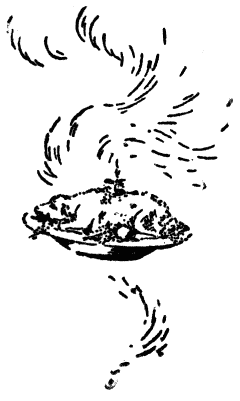
The stars were clustered chiefly near the fire, and were less like stars than spots of the phosphorescent wood that are scattered on the ground when one knocks a rotten stump about to lick up its swarms of wood-ants. So Jack came closer, and at last so close that even his dull eyes could see. The great gray lake was a flock of sheep and the phosphorescent specks were their eyes. Close by the fire was a log or a low rough bank—that turned out to be the shepherd and his dog. Both were objectionable features, but the sheep extended far from them. Jack knew that his business was with the flock.
He came very close to the edge and found them surrounded by a low hedge of chaparral; but what little things they were compared with that great and terrible ram that he dimly remembered! The blood-thirst came on him. He swept the low hedge aside, charged into the mass of sheep that surged away from him with rushing sounds of feet and murmuring groans, struck down one, seized it, and turning away, he scrambled back up the mountains.
The sheep-herder leaped to his feet, fired his gun, and the dog came running over the solid mass of sheep, barking loudly. But Jack was gone. The sheep-herder contented himself with making two or three fires, shooting off his gun, and telling his beads.
That was Jack's first mutton, but it was not the last. Thenceforth when he wanted a sheep—and it became a regular need—he knew he had merely to walk along the ridge till his nose said, "Turn, and go so," for smelling is believing in Bear life.
VII. THE FRESHET

Pedro Tampico and his brother Faco were not in the sheep business for any maudlin sentiment. They did not march ahead of their beloveds waving a crook as wand of office or appealing to the esthetic sides of their ideal followers with a tabret and pipe. Far from leading the flock with a symbol, they drove them with an armful of ever-ready rocks and clubs. They were not shepherds; they were sheep-herders. They did not view their charges as loved and loving followers, but as four-legged cash; each sheep was worth a dollar bill. They were cared for only as a man cares for his money, and counted after each alarm or day of travel. It is not easy for any one to count three thousand sheep, and for a Mexican sheep-herder it is an impossibility. But he has a simple device which answers the purpose. In an ordinary flock about one sheep in a hundred is a black one. If a portion of the flock has gone astray, there is likely to be a black one in it. So by counting his thirty black sheep each day Tampico kept rough count of his entire flock.
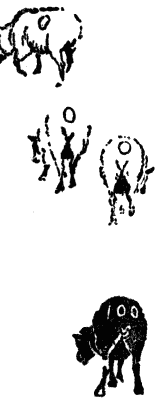
Grizzly Jack had killed but one sheep that first night. On his next visit he killed two, and on the next but one, yet that last one happened to be black, and when Tampico found but twenty-nine of its kind remaining he safely reasoned that he was losing sheep—according to the index a hundred were gone.
"If the land is unhealthy move out" is ancient wisdom. Tampico filled his pocket with stones, and reviling his charges in all their walks in life and history, he drove them from the country that was evidently the range of a sheep-eater. At night he found a walled-in cañon, a natural corral, and the woolly scattering swarm, condensed into a solid fleece, went pouring into the gap, urged intelligently by the dog and idiotically by the man. At one side of the entrance Tampico made his fire. Some thirty feet away was a sheer wall of rock.
Ten miles may be a long day's travel for a wretched wool-plant, but it is little more than two hours for a Grizzly. It is farther than eyesight, but it is well within nosesight, and Jack, feeling mutton-hungry, had not the least difficulty in following his prey. His supper was a little later than usual, but his appetite was the better for that. There was no alarm in camp, so Tampico had fallen asleep. A growl from the dog awakened him. He started up to behold the most appalling creature that he had ever seen or imagined, a monster Bear standing on his hind legs, and thirty feet high at least. The dog fled in terror, but was valor itself compared with Pedro. He was so frightened that he could not express the prayer that was in his breast: "Blessed saints, let him have every sin-blackened sheep in the band, but spare your poor worshiper," and he hid his head; so never learned that he saw, not a thirty-foot Bear thirty feet away, but a seven-foot Bear not far from the fire and casting a black thirty-foot shadow on the smooth rock behind. And, helpless with fear, poor Pedro groveled in the dust.
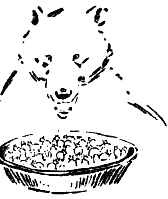
When he looked up the giant Bear was gone. There was a rushing of the sheep. A small body of them scurried out of the cañon into the night, and after them went an ordinary-sized Bear, undoubtedly a cub of the monster.
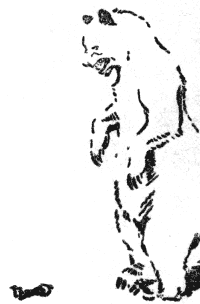
Pedro had been neglecting his prayers for some months back, but he afterward assured his father confessor that on this night he caught up on all arrears and had a goodly surplus before morning. At sunrise he left his dog in charge of the flock and set out to seek the runaways, knowing, first, that there was little danger in the day-time, second, that some would escape. The missing ones were a considerable number, raised to the second power indeed, for two more black ones were gone. Strange to tell, they had not scattered, and Pedro trailed them a mile or more in the wilderness till he reached another very small box cañon. Here he found the missing flock perched in various places on boulders and rocky pinnacles as high up as they could get. He was delighted and worked for half a minute on his bank surplus of prayers, but was sadly upset to find that nothing would induce the sheep to come down from the rocks or leave that cañon. One or two that he manoeuvered as far as the outlet sprang back in fear from something on the ground, which, on examination, he found—yes, he swears to this—to be the deep-worn, fresh-worn pathway of a Grizzly from one wall across to the other. All the sheep were now back again beyond his reach. Pedro began to fear for himself, so hastily returned to the main flock. He was worse off than ever now. The other Grizzly was a Bear of ordinary size and ate a sheep each night, but the new one, into whose range he had entered, was a monster, a Bear mountain, requiring forty or fifty sheep to a meal. The sooner he was out of this the better.

It was now late, too late, and the sheep were too tired to travel, so Pedro made unusual preparations for the night: two big fires at the entrance to the cañon, and a platform fifteen feet up in a tree for his own bed. The dog could look out for himself.
VIII. ROARING IN THE CAÑON
Pedro knew that the big Bear was coming; for the fifty sheep in the little cañon were not more than an appetizer for such a creature. He loaded his gun carefully as a matter of habit and went up-stairs to bed. Whatever defects his dormitory had the ventilation was good, and Pedro was soon a-shiver. He looked down in envy at his dog curled up by the fire; then he prayed that the saints might intervene and direct the steps of the Bear toward the flock of some neighbor, and carefully specified the neighbor to avoid mistakes. He tried to pray himself to sleep. It had never failed in church when he was at the Mission, so why now? But for once it did not succeed. The fearsome hour of midnight passed, then the gray dawn, the hour of dull despair, was near. Tampico felt it, and a long groan vibrated through his chattering teeth. His dog leaped up, barked savagely, the sheep began to stir, then went backing into the gloom; there was a rushing of stampeding sheep and a huge, dark form loomed up. Tampico grasped his gun and would have fired, when it dawned on him with sickening horror that the Bear was thirty feet high, his platform was only fifteen, just a convenient height for the monster. None but a madman would invite the Bear to eat by shooting at him now. So Pedro flattened himself face downward on the platform, and, with his mouth to a crack, he poured forth prayers to his representative in the sky, regretting his unconventional attitude and profoundly hoping that it would be overlooked as unavoidable, and that somehow the petitions would get the right direction after leaving the under side of the platform.
In the morning he had proof that his prayers had been favorably received. There was a Bear-track, indeed, but the number of black sheep was unchanged, so Pedro filled his pocket with stones and began his usual torrent of remarks as he drove the flock.
"Hyah, Capitan—you huajalote," as the dog paused to drink. "Bring back those ill-descended sons of perdition," and a stone gave force to the order, which the dog promptly obeyed. Hovering about the great host of grumbling hoofy locusts, he kept them together and on the move, while Pedro played the part of a big, noisy, and troublesome second.
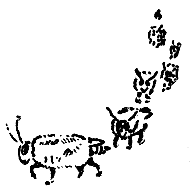
As they journeyed through the open country the sheep-herder's eye fell on a human figure, a man sitting on a rock above them to the left. Pedro gazed inquiringly; the man saluted and beckoned. This meant "friend"; had he motioned him to pass on it might have meant, "Keep away or I shoot." Pedro walked toward him a little way and sat down. The man came forward. It was Lan Kellyan, the hunter.
Each was glad of a chance to "talk with a human" and to get the news. The latest concerning the price of wool, the Bull-and-Bear fiasco, and, above all, the monster Bear that had killed Tampico's sheep, afforded topics of talk. "Ah, a Bear devill—de hell-brute—a Gringo Bear—pardon, my amigo, I mean a very terroar."

As the sheep-herder enlarged on the marvelous cunning of the Bear that had a private sheep corral of his own, and the size of the monster, forty or fifty feet high now—for such Bears are of rapid and continuous growth—Kellyan's eye twinkled and he said:
"Say, Pedro, I believe you once lived pretty nigh the Hassayampa, didn't you?"

This does not mean that that is a country of great Bears, but was an allusion to the popular belief that any one who tastes a single drop of the Hassayampa River can never afterward tell the truth. Some scientists who have looked into the matter aver that this wonderful property is common to the Rio Grande as well as the Hassayampa, and, indeed, all the rivers of Mexico, as well as their branches, and the springs, wells, ponds, lakes, and irrigation ditches. However that may be, the Hassayampa is the best-known stream of this remarkable peculiarity. The higher one goes, the greater its potency, and Pedro was from the headwaters. But he protested by all the saints that his story was true. He pulled out a little bottle of garnets, got by glancing over the rubbish laid about their hills by the desert ants; he thrust it back into his wallet and produced another bottle with a small quantity of gold-dust, also gathered at the rare times when he was not sleepy, and the sheep did not need driving, watering, stoning, or reviling.
"Here, I bet dat it ees so."
Gold is a loud talker.
Kellyan paused. "I can't cover your bet, Pedro, but I'll kill your Bear for what's in the bottle."
"I take you," said the sheep-herder, "eef you breeng back dose sheep dat are now starving up on de rocks of de cañon of Baxstaire's."
The Mexican's eyes twinkled as the white man closed on the offer. The gold in the bottle, ten or fifteen dollars, was a trifle, and yet enough to send the hunter on the quest—enough to lure him into the enterprise, and that was all that was needed. Pedro knew his man: get him going and profit would count for nothing; having put his hand to the plow Lan Kellyan would finish the furrow at any cost; he was incapable of turning back. And again he took up the trail of Grizzly Jack, his one-time "pard," now grown beyond his ken.
The hunter went straight to Baxter's cañon and found the sheep high-perched upon the rocks. By the entrance he found the remains of two of them recently devoured, and about them the tracks of a medium-sized Bear. He saw nothing of the pathway—the dead-line—made by the Grizzly to keep the sheep prisoners till he should need them. But the sheep were standing in stupid terror on various high places, apparently willing to starve rather than come down. Lan dragged one down; at once it climbed up again. He now realized the situation, so made a small pen of chaparral outside the cañon, and dragging the dull creatures down one at a time, he carried them—except one—out of the prison of death and into the pen. Next he made a hasty fence across the cañon's mouth, and turning the sheep out of the pen, he drove them by slow stages toward the rest of the flock.
Only six or seven miles across country, but it was late night when Lan arrived.
Tampico gladly turned over half of the promised dust. That night they camped together, and, of course, no Bear appeared.
In the morning Lan went back to the cañon and found, as expected, that the Bear had returned and killed the remaining sheep.
The hunter piled the rest of the carcasses in an open place, lightly sprinkled the Grizzly's trail with some very dry brush, then making a platform some fifteen feet from the ground in a tree, he rolled up in his blanket there and slept.
An old Bear will rarely visit a place three nights in succession; a cunning Bear will avoid a trail that has been changed overnight; a skilful Bear goes in absolute silence. But Jack was neither old, cunning, nor skilful. He came for the fourth time to the cañon of the sheep. He followed his old trail straight to the delicious mutton bones. He found the human trail, but there was something about it that rather attracted him. He strode along on the dry boughs. "Crack!" went one; "crack-crack!" went another; and Kellyan arose on the platform and strained his eyes in the gloom till a dark form moved into the opening by the bones of the sheep. The hunter's rifle cracked, the Bear snorted, wheeled into the bushes, and, crashing away, was gone.
IX. FIRE AND WATER

That was Jack's baptism of fire, for the rifle had cut a deep flesh-wound in his back. Snorting with pain and rage, he tore through the bushes and traveled on for an hour or more, then lay down and tried to lick the wound, but it was beyond reach. He could only rub it against a log. He continued his journey back toward Tallac, and there, in a cave that was formed of tumbled rocks, he lay down to rest. He was still rolling about in pain when the sun was high and a strange smell of fire came searching through the cave; it increased, and volumes of blinding smoke were about him. It grew so choking that he was forced to move, but it followed him till he could bear it no longer, and he dashed out of another of the ways that led into the cavern. As he went he caught a distant glimpse of a man throwing wood on the fire by the in-way, and the whiff that the wind brought him said: "This is the man that was last night watching the sheep." Strange as it may seem, the woods were clear of smoke except for a trifling belt that floated in the trees, and Jack went striding away in peace. He passed over the ridge, and finding berries, ate the first meal he had known since killing his last sheep. He had wandered on, gathering fruit and digging roots, for an hour or two, when the smoke grew blacker, the smell of fire stronger. He worked away from it, but in no haste. The birds, deer, and wood hares were now seen scurrying past him. There was a roaring in the air. It grew louder, was coming nearer, and Jack turned to stride after the wood things that fled.

The whole forest was ablaze; the wind was rising, and the flames, gaining and spreading, were flying now like wild horses. Jack had no place in his brain for such a thing; but his instinct warned him to shun that coming roaring that sent above dark clouds and flying fire-flakes, and messengers of heat below, so he fled before it, as the forest host was doing. Fast as he went, and few animals can outrun a Grizzly in rough country, the hot hurricane was gaining on him. His sense of danger had grown almost to terror, terror of a kind that he had never known before, for here there was nothing he could fight; nothing that he could resist. The flames were all around him now; birds without number, hares, and deer had gone down before the red horror. He was plunging wildly on through chaparral and manzanita thickets that held all feebler things until the fury seized them; his hair was scorching, his wound was forgotten, and he thought only of escape when the brush ahead opened, and the Grizzly, smoke-blinded, half roasted, plunged down a bank and into a small clear pool. The fur on his back said "hiss," for it was sizzling-hot. Down below he went, gulping the cool drink, wallowing in safety and unheat. Down below the surface he crouched as long as his lungs would bear the strain, then slowly and cautiously he raised his head. The sky above was one great sheet of flame. Sticks aflame and flying embers came in hissing showers on the water. The air was hot, but breathable at times, and he filled his lungs till he had difficulty in keeping his body down below. Other creatures there were in the pool, some burnt, some dead, some small and in the margin, some bigger in the deeper places, and one of them was close beside him. Oh, he knew that smell; fire—all Sierra's woods ablaze—could not disguise the hunter who had shot at him from the platform, and, though he did not know this, the hunter really who had followed him all day, and who had tried to smoke him out of his den and thereby set the woods ablaze. Here they were, face to face, in the deepest end of the little pool; they were only ten feet apart and could not get more than twenty feet apart. The flames grew unbearable. The Bear and man each took a hasty breath and bobbed below the surface, each wondering, according to his intelligence, what the other would do. In half a minute both came up again, each relieved to find the other no nearer. Each tried to keep his nose and one eye above the water. But the fire was raging hot; they had to dip under and stay as long as possible.

The roaring of the flame was like a hurricane. A huge pine tree came crashing down across the pool; it barely missed the man. The splash of water quenched the blazes for the most part, but it gave off such a heat that he had to move—a little nearer to the Bear. Another fell at an angle, killing a coyote, and crossing the first tree. They blazed fiercely at their junction, and the Bear edged from it a little nearer the man. Now they were within touching distance. His useless gun was lying in shallow water near shore, but the man had his knife ready, ready for self-defense. It was not needed; the fiery power had proclaimed a peace. Bobbing up and dodging under, keeping a nose in the air and an eye on his foe, each spent an hour or more. The red hurricane passed on. The smoke was bad in the woods, but no longer intolerable, and as the Bear straightened up in the pool to move away into shallower water and off into the woods, the man got a glimpse of red blood streaming from the shaggy back and dyeing the pool. The blood on the trail had not escaped him. He knew that this was the Bear of Baxter's cañon, this was the Gringo Bear, but he did not know that this was also his old-time Grizzly Jack. He scrambled out of the pond, on the other side from that taken by the Grizzly, and, hunter and hunted, they went their diverse ways.
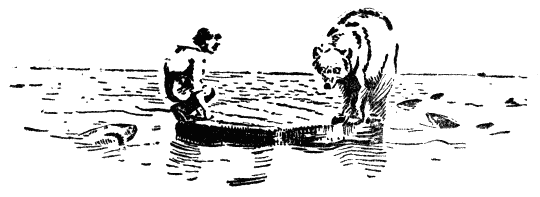
X. THE EDDY

All the west slopes of Tallac were swept by the fire, and Kellyan moved to a new hut on the east side, where still were green patches; so did the grouse and the rabbit and the coyote, and so did Grizzly Jack. His wound healed quickly, but his memory of the rifle smell continued; it was a dangerous smell, a new and horrible kind of smoke—one he was destined to know too well; one, indeed, he was soon to meet again. Jack was wandering down the side of Tallac, following a sweet odor that called up memories of former joys—the smell of honey, though he did not know it. A flock of grouse got leisurely out of his way and flew to a low tree, when he caught a whiff of man smell, then heard a crack like that which had stung him in the sheep-corral, and down fell one of the grouse close beside him. He stepped forward to sniff just as a man also stepped forward from the opposite bushes. They were within ten feet of each other, and they recognized each other, for the hunter saw that it was a singed Bear with a wounded side, and the Bear smelt the rifle-smoke and the leather clothes. Quick as a Grizzly—that is, quicker than a flash—the Bear reared. The man sprang backward, tripped and fell, and the Grizzly was upon him. Face to earth the hunter lay like dead, but, ere he struck, Jack caught a scent that made him pause. He smelt his victim, and the smell was the rolling back of curtains or the conjuring up of a past. The days in the hunter's shanty were forgotten, but the feelings of those days were ready to take command at the bidding of the nose. His nose drank deep of a draft that quelled all rage. The Grizzly's humor changed. He turned and left the hunter quite unharmed.
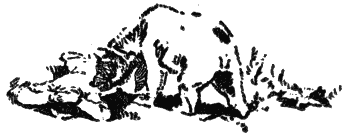
Oh, blind one with the gun! All he could find in explanation was: "You kin never tell what a Grizzly will do, but it's good play to lay low when he has you cornered." It never came into his mind to credit the shaggy brute with an impulse born of good, and when he told the sheep-herder of his adventure in the pool, of his hitting high on the body and of losing the trail in the forest fire—"down by the shack, when he turned up sudden and had me I thought my last day was come. Why he didn't swat me, I don't know. But I tell you this, Pedro: the B'ar what killed your sheep on the upper pasture and in the sheep cañon is the same. No two B'ars has hind feet alike when you get a clear-cut track, and this holds out even right along."
"What about the fifty-foot B'ar I saw wit' mine own eyes, caramba?"
"That must have been the night you were working a kill-care with your sheep-herder's delight. But don't worry; I'll get him yet."
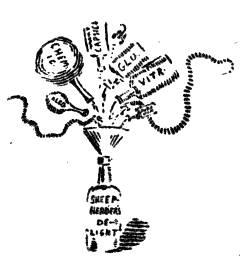
So Kellyan set out on a long hunt, and put in practice every trick he knew for the circumventing of a Bear. Lou Bonamy was invited to join with him, for his yellow cur was a trailer. They packed four horses with stuff and led them over the ridge to the east side of Tallac, and down away from Jack's Peak, that Kellyan had named in honor of his Bear cub, toward Fallen Leaf Lake. The hunter believed that here he would meet not, only the Gringo Bear that he was after, but would also stand a chance of finding others, for the place had escaped the fire.
They quickly camped, setting up their canvas sheet for shade more than against rain, and after picketing their horses in a meadow, went out to hunt. By circling around Leaf Lake they got a good idea of the wild population: plenty of deer, some Black Bear, and one or two Cinnamon and Grizzly, and one track along the shore that Kellyan pointed to, briefly saying: "That's him."
"Ye mean old Pedro's Gringo?"
"Yep. That's the fifty-foot Grizzly. I suppose he stands maybe seven foot high in daylight, but, 'course, B'ars pulls out long at night."
So the yellow cur was put on the track, and led away with funny little yelps, while the two hunters came stumbling along behind him as fast as they could, calling, at times, to the dog not to go so fast, and thus making a good deal of noise, which Gringo Jack heard a mile away as he ambled along the mountain-side above them. He was following his nose to many good and eatable things, and therefore going up-wind. This noise behind was so peculiar that he wanted to smell it, and to do that he swung along back over the clamor, then descended to the down-wind side, and thus he came on the trail of the hunters and their dog.
His nose informed him at once. Here was the hunter he once felt kindly toward and two other smells of far-back—both hateful; all three were now the smell-marks of foes, and a rumbling "woof" was the expressive sound that came from his throat.
That dog-smell in particular roused him, though it is very sure he had forgotten all about the dog, and Gringo's feet went swiftly and silently, yes, with marvelous silence, along the tracks of the enemy.

On rough, rocky ground a dog is scarcely quicker than a Bear, and since the dog was constantly held back by the hunters the Bear had no difficulty in overtaking them. Only a hundred yards or so behind he continued, partly in curiosity, pursuing the dog that was pursuing him, till a shift of the wind brought the dog a smell-call from the Bear behind. He wheeled—of course you never follow trail smell when you can find body smell—and came galloping back with a different yapping and a bristling in his mane.
"Don't understand that," whispered Bonamy.
"It's B'ar, all right," was the answer; and the dog, bounding high, went straight toward the foe.
Jack heard him coming, smelt him coming, and at length saw him coming; but it was the smell that roused him—the full scent of the bully of his youth. The anger of those days came on him, and cunning enough to make him lurk in ambush: he backed to one side of the trail where it passed under a root, and, as the little yellow tyrant came, Jack hit him once, hit him as he had done some years before, but now with the power of a grown Grizzly. No yelp escaped the dog, no second blow was needed. The hunters searched in silence for half an hour before they found the place and learned the tale from many silent tongues.
"I'll get even with him," muttered Bonamy, for he loved that contemptible little yap-cur.
"That's Pedro's Gringo, all right. He's sure cunning to run his own back track. But we'll fix him yet," and they vowed to kill that Bear or "get done up" themselves.
Without a dog, they must make a new plan of hunting. They picked out two or three good places for pen-traps, where trees stood in pairs to make the pillars of the den. Then Kellyan returned to camp for the ax while Bonamy prepared the ground.
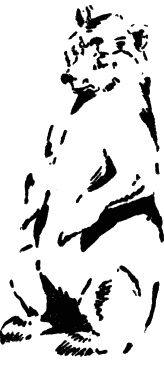
As Kellyan came near their open camping-place, he stopped from habit and peeped ahead for a minute. He was about to go down when a movement caught his eye. There, on his haunches, sat a Grizzly, looking down on the camp. The singed brown of his head and neck, and the white spot on each side of his back, left no doubt that Kellyan and Pedro's Gringo were again face to face. It was a long shot, but the rifle went up, and as he was about to fire, the Bear suddenly bent his head down, and lifting his hind paw, began to lick at a little cut. This brought the head and chest nearly in line with Kellyan—a sure shot; so sure that he fired hastily. He missed the head and the shoulder, but, strange to say, he hit the Bear in the mouth and in the hind toe, carrying away one of his teeth and the side of one toe. The Grizzly sprang up with a snort, and came tearing down the hill toward the hunter. Kellyan climbed a tree and got ready, but the camp lay just between them, and the Bear charged on that instead. One sweep of his paw and the canvas tent was down and torn. Whack! and tins went flying this way. Whisk! and flour-sacks went that. Rip! and the flour went off like smoke. Slap—crack! and a boxful of odds and ends was scattered into the fire. Whack! and a bagful of cartridges was tumbled after it. Whang! and the water-pail was crushed. Pat-pat-pat! and all the cups were in useless bits.
Kellyan, safe up the tree, got no fair view to shoot—could only wait till the storm-center cleared a little. The Bear chanced on a bottle of something with a cork loosely in it. He seized it adroitly in his paws, twisted out the cork, and held the bottle up to his mouth with a comical dexterity that told of previous experience. But, whatever it was, it did not please the invader; he spat and spilled it out, and flung the bottle down as Kellyan gazed, astonished. A remarkable "crack! crack! crack!" from the fire was heard now, and the cartridges began to go off in ones, twos, fours, and numbers unknown. Gringo whirled about; he had smashed everything in view. He did not like that Fourth of July sound, so, springing to a bank, he went bumping and heaving down to the meadow and had just stampeded the horses when, for the first time, Gringo exposed himself to the hunter's aim. His flank was grazed by another leaden stinger, and Gringo, wheeling, went off into the woods.
The hunters were badly defeated. It was fully a week before they had repaired all the damage done by their shaggy visitor and were once more at Fallen Leaf Lake with a new store of ammunition and provisions, their tent repaired, and their camp outfit complete. They said little about their vow to kill that Bear. Both took for granted that it was a fight to the finish. They never said, "If we get him," but, "When we get him."
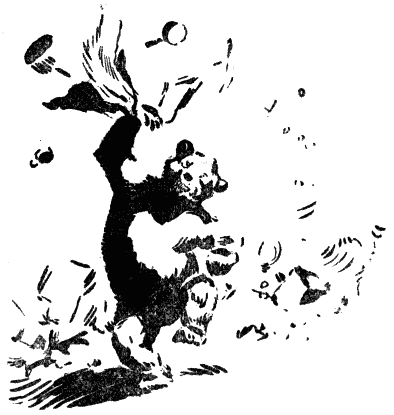
XI. THE FORD
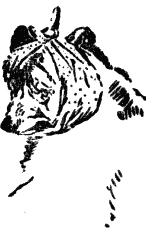
Gringo, savage, but still discreet, scaled the long mountain-side when he left the ruined camp, and afar on the southern slope he sought a quiet bed in a manzanita thicket, there to lie down and nurse his wounds and ease his head so sorely aching with the jar of his shattered tooth. There he lay for a day and a night, sometimes in great pain, and at no time inclined to stir. But, driven forth by hunger on the second day, he quit his couch and, making for the nearest ridge, he followed that and searched the wind with his nose. The smell of a mountain hunter reached him. Not knowing just what to do he sat down and did nothing. The smell grew stronger, he heard sounds of trampling; closer they came, then the brush parted and a man on horseback appeared. The horse snorted and tried to wheel, but the ridge was narrow and one false step might have been serious. The cowboy held his horse in hand and, although he had a gun, he made no attempt to shoot at the surly animal blinking at him and barring his path. He was an old mountaineer, and he now used a trick that had long been practised by the Indians, from whom, indeed, he learned it. He began "making medicine with his voice."
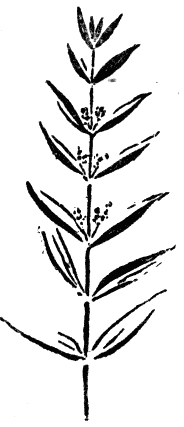
"See here now, B'ar," he called aloud, "I ain't doing nothing to you. I ain't got no grudge ag'in' you, an' you ain't got no right to a grudge ag'in' me."
"Gro-o-o-h," said Gringo, deep and low.
"Now, I don't want no scrap with you, though I have my scrap-iron right handy, an' what I want you to do is just step aside an' let me pass that narrer trail an' go about my business."
"Grow—woo-oo-wow," grumbled Gringo.
"I'm honest about it, pard. You let me alone, and I'll let you alone; all I want is right of way for five minutes."
"Grow-grow-wow-oo-umph," was the answer.
"Ye see, thar's no way round an' on'y one way through, an' you happen to be settin' in it. I got to take it, for I can't turn back. Come, now, is it a bargain—hands off and no scrap?"
It is very sure that Gringo could see in this nothing but a human making queer, unmenacing, monotonous sounds, so giving a final "Gr-u-ph," the Bear blinked his eyes, rose to his feet and strode down the bank, and the cowboy forced his unwilling horse to and past the place.
"Wall, wall," he chuckled, "I never knowed it to fail. Thar's whar most B'ars is alike."
If Gringo had been able to think clearly, he might have said: "This surely is a new kind of man."
XII. SWIRL AND POOL AND GROWING FLOOD
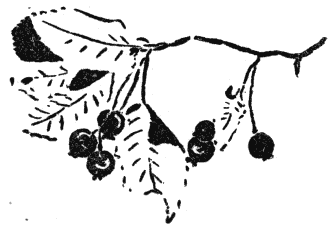
Gringo wandered on with nose alert, passing countless odors of berries, roots, grouse, deer, till a new and pleasing smell came with especial force. It was not sheep, or game, or a dead thing. It was a smell of living meat. He followed the guide to a little meadow, and there he found it. There were five of them, red, or red and white—great things as big as himself; but he had no fear of them. The hunter instinct came on him, and the hunter's audacity and love of achievement. He sneaked toward them upwind in order that he might still smell them, and it also kept them from smelling him. He reached the edge of the wood. Here he must stop or be seen. There was a watering-place close by. He silently drank, then lay down in a thicket where he could watch. An hour passed thus. The sun went down and the cattle arose to graze. One of them, a small one, wandered nearer, then, acting suddenly with purpose, walked to the water-hole. Gringo watched his chance, and as she floundered in the mud and stooped he reared and struck with all his force. Square at her skull he aimed, and the blow went straight. But Gringo knew nothing of horns. The young, sharp horn, upcurling, hit his foot and was broken off; the blow lost half its power. The beef went down, but Gringo had to follow up the blow, then raged and tore in anger for his wounded paw. The other cattle fled from the scene. The Grizzly took the heifer in his jaws, then climbed the hill to his lair, and with this store of food he again lay down to nurse his wounds. Though painful, they were not serious, and within a week or so Grizzly Jack was as well as ever and roaming the woods about Fallen Leaf Lake and farther south and east, for he was extending his range as he grew—the king was coming to his kingdom. In time he met others of his kind and matched his strength with theirs. Sometimes he won and sometimes lost, but he kept on growing as the months went by, growing and learning and adding to his power.
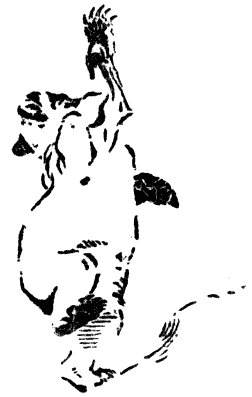
Kellyan had kept track of him and knew at least the main facts of his life, because he had one or two marks that always served to distinguish him. A study of the tracks had told of the round wound in the front foot and the wound in the hind foot. But there was another: the hunter had picked up the splinters of bone at the camp where he had fired at the Bear, and, after long doubt, he guessed that he had broken a tusk. He hesitated to tell the story of hitting a tooth and hind toe at the same shot till, later, he had clearer proof of its truth.
No two animals are alike. Kinds which herd have more sameness than those that do not, and the Grizzly, being a solitary kind, shows great individuality. Most Grizzlies mark their length on the trees by rubbing their backs, and some will turn on the tree and claw it with their fore paws; others hug the tree with fore paws and rake it with their hind claws. Gringo's peculiarity of marking was to rub first, then turn and tear the trunk with his teeth.
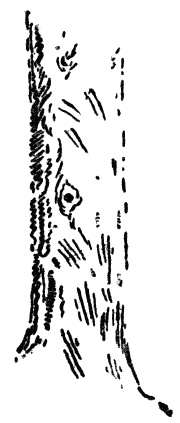
It was on examining one of the Bear trees one day that Kellyan discovered the facts. He had been tracking the Bear all morning, had a fine set of tracks in the dusty trail, and thus learned that the rifle-wound was a toe-shot in the hind foot, but his fore foot of the same side had a large round wound, the one really made by the cow's horn. When he came to the Bear tree where Gringo had carved his initials, the marks were clearly made by the Bear's teeth, and one of the upper tusks was broken off, so the evidence of identity was complete.

"It's the same old B'ar," said Lan to his pard.
They failed to get sight of him in all this time, so the partners set to work at a series of Bear-traps. These are made of heavy logs and have a sliding door of hewn planks. The bait is on a trigger at the far end; a tug on this lets the door drop. It was a week's hard work to make four of these traps. They did not set them at once, for no Bear will go near a thing so suspiciously new-looking. Some Bears will not approach one till it is weather-beaten and gray. But they removed all chips and covered the newly cut wood with mud, then rubbed the inside with stale meat, and hung a lump of ancient venison on the trigger of each trap.
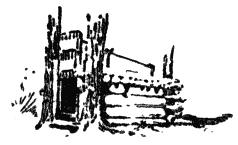
They did not go around for three days, knowing that the human smell must first be dissipated, and then they found but one trap sprung—the door down. Bonamy became greatly excited, for they had crossed the Grizzly's track close by. But Kellyan had been studying the dust and suddenly laughed aloud.
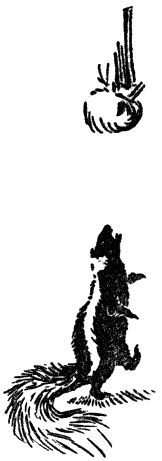
"Look at that,"—he pointed to a thing like a Bear-track, but scarcely two inches long. "There's the B'ar we'll find in that; that's a bushy-tailed B'ar," and Bonamy joined in the laugh when he realized that the victim in the big trap was nothing but a little skunk.
"Next time we'll set the bait higher and not set the trigger so fine."
They rubbed their boots with stale meat when they went the rounds, then left the traps for a week.
There are Bears that eat little but roots and berries; there are Bears that love best the great black salmon they can hook out of the pools when the long "run" is on; and there are Bears that have a special fondness for flesh. These are rare; they are apt to develop unusual ferocity and meet an early death. Gringo was one of them, and he grew like the brawny, meat-fed gladiators of old—bigger, stronger, and fiercer than his fruit-and root-fed kin. In contrast with this was his love of honey. The hunter on his trail learned that he never failed to dig out any bees' nest he could find, or, finding none, he would eat the little honey-flowers that hung like sleigh-bells on the heather. Kellyan was quick to mark the signs. "Say, Bonamy, we've got to find some honey."
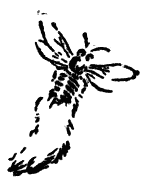
It is not easy to find a bee tree without honey to fill your bee-guides; so Bonamy rode down the mountain to the nearest camp, the Tampico sheep camp, and got not honey but some sugar, of which they made syrup. They caught bees at three or four different places, tagged them with cotton, filled them with syrup and let them fly, watching till the cotton tufts were lost to view, and by going on the lines till they met they found the hive. A piece of gunny-sack filled with comb was put on each trigger, and that night, as Gringo strode with that long, untiring swing that eats up miles like steam-wheels, his sentinel nose reported the delicious smell, the one that above the rest meant joy. So Gringo Jack followed fast and far, for the place was a mile away, and reaching the curious log cavern, he halted and sniffed. There were hunters' smells; yes, but, above all, that smell of joy. He walked around to be sure, and knew it was inside; then cautiously he entered. Some wood-mice scurried by. He sniffed the bait, licked it, mumbled it, slobbered it, reveled in it, tugged to increase the flow, when "bang!" went the great door behind and Jack was caught. He backed up with a rush, bumped into the door, and had a sense, at least, of peril. He turned over with an effort and attacked the door, but it was strong. He examined the pen; went all around the logs where their rounded sides seemed easiest to tear at with his teeth. But they yielded nothing. He tried them all; he tore at the roof, the floor; but all were heavy, hard logs, spiked and pinned as one.
The sun came up as he raged, and shone through the little cracks of the door, and so he turned all his power on that. The door was flat, gave little hold, but he battered with his paws and tore with his teeth till plank after plank gave way. With a final crash be drove the wreck before him and Jack was free again.
The men read the story as though in print; yes, better, for bits of plank can tell no lies, and the track to the pen and from the pen was the track of a big Bear with a cut on the hind foot and a curious round peg-like scar on the front paw, while the logs inside, where little torn, gave proof of a broken tooth.
"We had him that time, but he knew too much for us. Never mind, we'll see."
So they kept on and caught him again, for honey he could not resist. But the wreckage of the trap was all they found in the morning.
Pedro's brother knew a man who had trapped Bears, and the sheep-herder remembered that it is necessary to have the door quite light-tight rather than very strong, so they battened all with tar-paper outside. But Gringo was learning "pen-traps." He did not break the door that he did not see through, but he put one paw under and heaved it up when he had finished the bait. Thus he baffled them and sported with the traps, till Kellyan made the door drop into a deep groove so that the Bear could put no claw beneath it. But it was cold weather now. There was deepening snow on the Sierras. The Bear sign disappeared. The hunters knew that Gringo was sleeping his winter's sleep.

XIII. THE DEEPENING CHANNEL
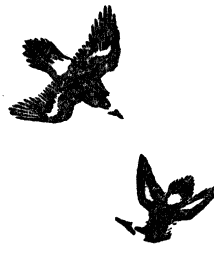
April was bidding high Sierra snows go back to Mother Sea. The California woodwales screamed in clamorous joy. They thought it was about a few acorns left in storage in the Live Oak bark, but it really was joy of being alive. This outcry was to them what music is to the thrush, what joy-bells are to us—a great noise to tell how glad they were. The deer were bounding, grouse were booming, rills were rushing—all things were full of noisy gladness.
Kellyan and Bonamy were back on the Grizzly quest. "Time he was out again, and good trailing to get him, with lots of snow in the hollows." They had come prepared for a long hunt. Honey for bait, great steel traps with crocodilian jaws, and guns there were in the outfit. The pen-trap, the better for the aging, was repaired and re-baited, and several Black Bears were taken. But Gringo, if about, had learned to shun it.

He was about, and the men soon learned that. His winter sleep was over. They found the peg-print in the snow, but with it, or just ahead, was another, the tracks of a smaller Bear.

"See that," and Kellyan pointed to the smaller mark. "This is mating-time; this is Gringo's honeymoon," and he followed the trail for a while, not expecting to find them, but simply to know their movements. He followed several times and for miles, and the trail told him many things. Here was the track of a third Bear joining. Here were marks of a combat, and a rival driven away was written there, and then the pair went on. Down from the rugged hills it took him once to where a love-feast had been set by the bigger Bear; for the carcass of a steer lay half devoured, and the telltale ground said much of the struggle that foreran the feast. As though to show his power, the Bear had seized the steer by the nose and held him for a while—so said the trampled earth for rods—struggling, bellowing, no doubt, music for my lady's ears, till Gringo judged it time to strike him down with paws of steel.
Once only the hunters saw the pair—a momentary Glimpse of a Bear so huge they half believed Tampico's tale, and a Bear of lesser size in fur that rolled and rippled in the sun with brown and silver lights.
"Oh, ain't that just the beautifulest thing that ever walked!" and both the hunters gazed as she strode from view in the chaparral. It was only a neck of the thicket; they both must reappear in a minute at the other side, and the men prepared to fire; but for some incomprehensible reason the two did not appear again. They never quit the cover, and had wandered far away before the hunters knew it, and were seen of them no more.
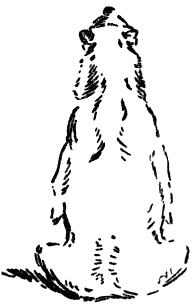
But Faco Tampico saw them. He was visiting his brother with the sheep, and hunting in the foot-hills to the eastward, in hopes of getting a deer, his small black eyes fell on a pair of Bears, still love-bound, roaming in the woods. They were far below him. He was safe, and he sent a ball that laid the she-Bear low; her back was broken. She fell with a cry of pain and vainly tried to rise. Then Gringo rushed around, sniffed the wind for the foe, and Faco fired again. The sound and the smoke-puff told Gringo where the man lay hid. He raged up the cliff, but Faco climbed a tree, and Gringo went back to his mate. Faco fired again; Gringo made still another effort to reach him, but could not find him now, so returned to his "Silver-brown."
Whether it was chance or choice can never be known, but when Faco fired once more, Gringo Jack was between, and the ball struck him. It was the last in Faco's pouch, and the Grizzly, charging as before, found not a trace of the foe. He was gone—had swung across a place no Bear could cross and soon was a mile away. The big Bear limped back to his mate, but she no longer responded to his touch. He watched about for a time, but no one came. The silvery hide was never touched by man, and when the semblance of his mate was gone, Gringo quit the place.
The world was full of hunters, traps, and guns. He turned toward the lower hills where the sheep grazed, where once he had raided Pedro's flocks, limping along, for now he had another flesh-wound. He found the scent of the foe that killed his "Silver-brown," and would have followed, but it ceased at a place where a horse-track joined. Yet he found it again that night, mixed with the sheep smell so familiar once. He followed this, sore and savage. It led him to a settler's flimsy shack, the house of Tampico's parents, and as the big Bear reached it two human beings scrambled out of the rear door.
"My husband," shrieked the woman, "pray! Let us pray to the saints for help!"
"Where is my pistol?" cried the husband.
"Trust in the saints," said the frightened woman.
"Yes, if I had a cannon, or if this was a cat; but with only a pepper-box pistol to meet a Bear mountain it is better to trust to a tree," and old Tampico scrambled up a pine.
The Grizzly looked into the shack, then passed to the pig-pen, killed the largest there, for this was a new kind of meat, and carrying it off, he made his evening meal.
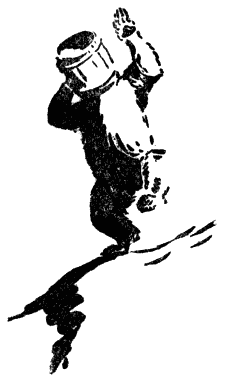

He came again and again to that pig-pen. He found his food there till his wound was healed. Once he met with a spring-gun, but it was set too high. Six feet up, the sheep-folk judged, would be just about right for such a Bear; the charge went over his head, and so he passed unharmed—a clear proof that he was a devil. He was learning this: the human smell in any form is a smell of danger. He quit the little valley of the shack, wandering downward toward the plains. He passed a house one night, and walking up, he discovered a hollow thing with a delicious smell. It was a ten-gallon keg that had been used for sugar, some of which was still in the bottom, and thrusting in his huge head, the keg-rim, bristling with nails, stuck to him. He raged about, clawing at it wildly and roaring in it until a charge of shot from the upper windows stirred him to such effort that the keg was smashed to bits and his blinders removed.
Thus the idea was slowly borne in on him: going near a man-den is sure to bring trouble. Thenceforth he sought his prey in the woods or on the plains. He one day found the man scent that enraged him the day he lost his "Silver-brown." He took the trail, and passing in silence incredible for such a bulk, he threaded chaparral and manzanita on and down through tule-beds till the level plain was reached. The scent led on, was fresher now. Far out were white specks—moving things. They meant nothing to Gringo, for he had never smelt wild geese, had scarcely seen them, but the trail he was hunting went on. He swiftly followed till the tule ahead rustled gently, and the scent was body scent. A ponderous rush, a single blow—and the goose-hunt was ended ere well begun, and Faco's sheep became the brother's heritage.
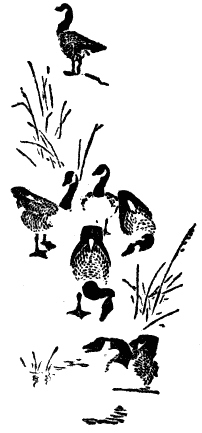
XIV. THE CATARACT
Just as fads will for a time sway human life, so crazes may run through all animals of a given kind. This was the year when a beef-eating craze seemed to possess every able-bodied Grizzly of the Sierras. They had long been known as a root-eating, berry-picking, inoffensive race when let alone, but now they seemed to descend on the cattle-range in a body and make their diet wholly of flesh.
One cattle outfit after another was attacked, and the whole country seemed divided up among Bears of incredible size, cunning, and destructiveness. The cattlemen offered bounties—good bounties, growing bounties, very large bounties at last—but still the Bears kept on. Very few were killed, and it became a kind of rude jest to call each section of the range, not by the cattle brand, but by the Grizzly that was quartered on its stock.
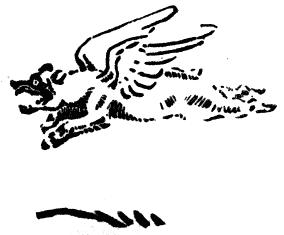
Wonderful tales were told of these various Bears of the new breed. The swiftest was Reelfoot, the Placerville cattle-killer that could charge from a thicket thirty yards away and certainly catch a steer before it could turn and run, and that could even catch ponies in the open when they were poor. The most cunning of all was Brin, the Mokelumne Grizzly that killed by preference blooded stock, would pick out a Merino ram or a white-faced Hereford from among fifty grades; that killed a new beef every night; that never again returned to it, or gave the chance for traps or poisoning.

The Pegtrack Grizzly of Feather River was rarely seen by any. He was enveloped in mysterious terror. He moved and killed by night. Pigs were his favorite food, and he had also killed a number of men.
But Pedro's Grizzly was the most marvelous. "Hassayampa," as the sheep-herder was dubbed, came one night to Kellyan's hut.
"I tell you he's still dere. He has keel me a t'ousand sheep. You telled me you keel heem; you haff not. He is beegare as dat tree. He eat only sheep—much sheep. I tell you he ees Gringo devil—he ees devil Bear. I haff three cows, two fat, one theen. He catch and keel de fat; de lean run off. He roll een dust—make great dust. Cow come for see what make dust; he catch her an' keel. My fader got bees. De devil Bear chaw pine; I know he by hees broke toof. He gum hees face and nose wit' pine gum so bees no sting, then eat all bees. He devil all time. He get much rotten manzanita and eat till drunk—locoed—then go crazy and keel sheep just for fun. He get beeg bull by nose and drag like rat for fun. He keel cow, sheep, and keel Face, too, for fun. He devil. You promise me you keel heem; you nevaire keel."
This is a condensation of Pedro's excited account.
And there was yet one more—the big Bear that owned the range from the Stanislaus to the Merced, the "Monarch of the Range" he had been styled. He was believed—yes, known to be—the biggest Bear alive, a creature of supernatural intelligence. He killed cows for food, and scattered sheep or conquered bulls for pleasure. It was even said that the appearance of an unusually big bull anywhere was a guaranty that Monarch would be there for the joy of combat with a worthy foe. A destroyer of cattle, sheep, pigs, and horses, and yet a creature known only by his track. He was never seen, and his nightly raids seemed planned with consummate skill to avoid all kinds of snares.
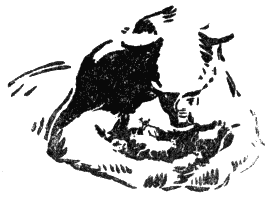
The cattlemen clubbed together and offered an enormous bounty for every Grizzly killed in the range. Bear-trappers came and caught some Bears, Brown and Cinnamon, but the cattle-killing went on. They set out better traps of massive steel and iron bars, and at length they caught a killer, the Mokelumne Grizzly; yes, and read in the dust how he had come at last and made the fateful step; but steel will break and iron will bend. The great Bear-trail was there to tell the tale: for a while he had raged and chafed at the hard black reptile biting into his paw; then, seeking a boulder, he had released the paw by smashing the trap to pieces on it. Thenceforth each year he grew more cunning, huge, and destructive.
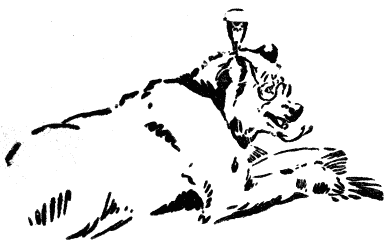
Kellyan and Bonamy came down from the mountains now, tempted by the offered rewards. They saw the huge tracks; they learned that cattle were not killed in all places at once. They studied and hunted. They got at length in the dust the full impressions of the feet of the various monsters in regions wide apart, and they saw that all the cattle were killed in the same way—their muzzles torn, their necks broken; and last, the marks on the trees where the Bears had reared and rubbed, then scored them with a broken tusk, the same all through the wide range; and Kellyan told them with calm certainty: "Pedro's Gringo, Old Pegtrack, the Placerville Grizzly, and the Monarch of the Range are one and the same Bear."
The little man from the mountains and the big man from the hills set about the task of hunting him down with an intensity of purpose which, like the river that is dammed, grew more fierce from being balked.
All manner of traps had failed for him. Steel traps he could smash, no log trap was strong enough to hold this furry elephant; he would not come to a bait; he never fed twice from the same kill.

Two reckless boys once trailed him to a rocky glen. The horses would not enter; the boys went in afoot, and were never seen again. The Mexicans held him in superstitious terror, believing that he could not be killed; and he passed another year in the cattle-land, known and feared now as the "Monarch of the Range," killing in the open by night, and retiring by day to his fastness in the near hills, where horsemen could not follow.
Bonamy had been called away; but all that summer, and winter, too,—for the Grizzly no longer "denned up,"—Kellyan rode and rode, each time too late or too soon to meet the Monarch. He was almost giving up, not in despair, but for lack of means, when a message came from a rich man, a city journalist, offering to multiply the reward by ten if, instead of killing the Monarch, he would bring him in alive.
Kellyan sent for his old partner, and when word came that the previous night three cows were killed in the familiar way near the Bell-Dash pasture, they spared neither horse nor man to reach the spot. A ten-hour ride by night meant worn-out horses, but the men were iron, and new horses with scarcely a minute's delay were brought them. Here were the newly killed beeves, there the mighty footprints with the scars that spelled his name. No hound could have tracked him better than Kellyan did. Five miles away from the foot of the hills was an impenetrable thicket of chaparral. The great tracks went in, did not come out, so Bonamy sat sentinel while Kellyan rode back with the news. "Saddle up the best we got!" was the order. Rifles were taken down and cartridge-belts being swung when Kellyan called a halt.
"Say, boys, we've got him safe enough. He won't try to leave the chaparral till night. If we shoot him we get the cattlemen's bounty; if we take him alive—an' it's easy in the open—we get the newspaper bounty, ten times as big. Let's leave all guns behind; lariats are enough."
"Why not have the guns along to be handy?"
"'Cause I know the crowd too well; they couldn't resist the chance to let him have it; so no guns at all. It's ten to one on the riata."

Nevertheless three of them brought their heavy revolvers. Seven gallant riders on seven fine horses, they rode out that day to meet the Monarch of the Range. He was still in the thicket, for it was yet morning. They threw stones in and shouted to drive him out, without effect, till the noon breeze of the plains arose—the down-current of air from the hills. Then they fired the grass in several places, and it sent a rolling sheet of flame and smoke into the thicket. There was a crackling louder than the fire, a smashing of brush, and from the farther side out hurled the Monarch Bear, the Gringo, Grizzly Jack. Horsemen were all about him now, armed not with guns but with the rawhide snakes whose loops in air spell bonds or death. The men were calm, but the horses were snorting and plunging in fear. This way and that the Grizzly looked up at the horsemen—a little bit; scarcely up at the horses; then turning without haste, he strode toward the friendly hills.
"Look out, now, Bill! Manuel! It's up to you."
Oh, noble horses, nervy men! oh, grand old Grizzly, how I see you now! Cattle-keepers and cattle-killer face to face!
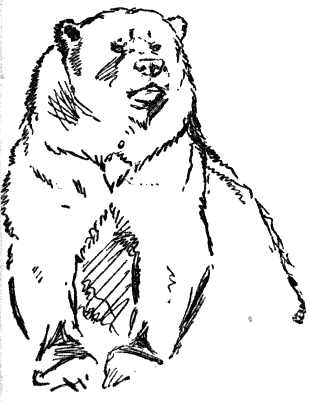
Three riders of the range that horse had never thrown were sailing, swooping, like falcons; their lariats swung, sang—sang higher—and Monarch, much perplexed, but scarcely angered yet, rose to his hind legs, then from his towering height looked down on horse and man. If, as they say, the vanquished prowess goes into the victor, then surely in that mighty chest, those arms like necks of bulls, was the power of the thousand cattle he had downed in fight.
"Caramba! what a Bear! Pedro was not so far astray."
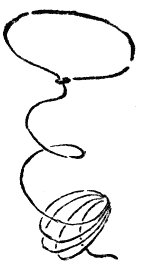
"Sing—sing—sing!" the lariats flew. "Swish—pat!" one, two, three, they fell. These were not men to miss. Three ropes, three horses, leaping away to bear on the great beast's neck. But swifter than thought the supple paws went up. The ropes were slipped, and the spurred cow-ponies, ready for the shock, went, shockless, bounding—loose ropes trailing afar.
"Hi—Hal! Ho—Lan! Head him!" as the Grizzly, liking not the unequal fight, made for the hills. But a deft Mexican in silver gear sent his hide riata whistling, then haunched his horse as the certain coil sank in the Grizzly's hock, and checked the Monarch with a heavy jar. Uttering one great snort of rage, he turned; his huge jaws crossed the rope, back nearly to his ears it went, and he ground it as a dog might grind a twig, so the straining pony bounded free.
Round and round him now the riders swooped, waiting their chance. More than once his neck was caught, but he slipped the noose as though it were all play. Again he was caught by a foot and wrenched, almost thrown, by the weight of two strong steeds, and now he foamed in rage. Memories of olden days, or more likely the habit of olden days, came on him—days when he learned to strike the yelping pack that dodged his blows. He was far from the burnt thicket, but a single bush was near, and setting his broad back to that, he waited for the circling foe. Nearer and nearer they urged the frightened steeds, and Monarch watched—waited, as of old, for the dogs, till they were almost touching each other, then he sprang like an avalanche of rock. What can elude a Grizzly's dash? The earth shivered as he launched himself, and trembled when he struck. Three men, three horses, in each other's way. The dust was thick; they only knew he struck—struck—struck! The horses never rose.
"Santa Maria!" came a cry of death, and hovering riders dashed to draw the Bear away. Three horses dead, one man dead, one nearly so, and only one escaped.
"Crack! crack! crack!" went the pistols now as the Bear went rocking his huge form in rapid charge for the friendly hills; and the four riders, urged by Kellyan, followed fast. They passed him, wheeled, faced him. The pistols had wounded him in many places.
"Don't shoot—don't shoot, but tire him out," the hunter urged.
"Tire him out? Look at Carlos and Manuel back there. How many minutes will it be before the rest are down with them?" So the infuriating pistols popped till all their shots were gone, and Monarch foamed with slobbering jaws of rage.
"Keep on! keep cool," cried Kellyan.
His lariat flew as the cattle-killing paw was lifted for an instant. The lasso bound his wrist. "Sing! Sing!" went two, and caught him by the neck. A bull with his great club-foot in a noose is surely caught, but the Grizzly raised his supple, hand-like, tapering paw and gave one jerk that freed it. Now the two on his neck were tight; he could not slip them. The horses at the ends—they were dragging, choking him; men were shouting, hovering, watching for a new chance, when Monarch, firmly planting both paws, braced, bent those mighty shoulders, and, spite of shortening breath, leaned back on those two ropes as Samson did on pillars of the house of Baal, and straining horses with their riders were dragged forward more and more, long grooves being plowed behind; dragging them, he backed faster and faster still. His eyes were starting, his tongue lolling out.

"Keep on! hold tight!" was the cry, till the ropers swung together, the better to resist; and Monarch, big and strong with frenzied hate, seeing now his turn, sprang forward like a shot. The horses leaped and escaped—almost; the last was one small inch too slow. The awful paw with jags of steel just grazed his flank. How slight it sounds! But what it really means is better not writ down.
The riders had slipped their ropes in fear, and the Monarch, rumbling, snorting, bounding, trailed them to the hills, there to bite them off in peace, while the remnant of the gallant crew went, sadly muttering, back.
Bitter words went round. Kellyan was cursed.
"His fault. Why didn't we have the guns?"
"We were all in it," was the answer, and more hard words, till Kellyan flushed, forgot his calm, and drew a pistol hitherto concealed, and the other "took it back."
XV. THE FOAMING FLOOD

"What is next, Lan?" said Lou, as they sat dispirited by the fire that night.
Kellyan was silent for a time, then said slowly and earnestly, with a gleam in his eye: "Lou, that's the greatest Bear alive. When I seen him set up there like a butte and swat horses like they was flies, I jest loved him. He's the greatest thing God has turned loose in these yer hills. Before to-day, I sure wanted to get him; now, Lou, I'm a-going to get him, an' get him alive, if it takes all my natural days. I think I kin do it alone, but I know I kin do it with you," and deep in Kellyan's eyes there glowed a little spark of something not yet rightly named.
They were camped in the hills, being no longer welcome at the ranch; the ranchers thought their price too high. Some even decided that the Monarch, being a terror to sheep, was not an undesirable neighbor. The cattle bounty was withdrawn, but the newspaper bounty was not.

"I want you to bring in that Bear," was the brief but pregnant message from the rich newsman when he heard of the fight with the riders.
"How are you going about it, Lan?"
Every bridge has its rotten plank, every fence its flimsy rail, every great one his weakness, and Kellyan, as he pondered, knew how mad it was to meet this one of brawn with mere brute force.
"Steel traps are no good; he smashes them. Lariats won't do, and he knows all about log traps. But I have a scheme. First, we must follow him up and learn his range. I reckon that'll take three months."
So the two kept on. They took up that Bear-trail next day; they found the lariats chewed off. They followed day after day. They learned what they could from rancher and sheepherder, and much more was told them than they could believe.
Three months, Lan said, but it took six months to carry out his plan; meanwhile Monarch killed and killed.
In each section of his range they made one or two cage- or pen-traps of bolted logs. At the back end of each they put a small grating of heavy steel bars. The door was carefully made and fitted into grooves. It was of double plank, with tar-paper between to make it surely light-tight. It was sheeted with iron on the inside, and when it dropped it went into an iron-bound groove in the floor.
They left these traps open and unset till they were grayed with age and smelt no more of man. Then the two hunters prepared for the final play. They baited all without setting them—baited them with honey, the lure that Monarch never had refused—and when at length they found the honey baits were gone, they came where he now was taking toll and laid the long-planned snare. Every trap was set, and baited as before with a mass of honey—but honey now mixed with a potent sleeping draft.
XVI. LANDLOCKED

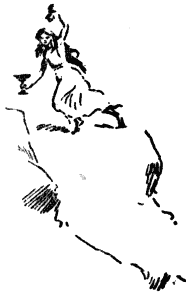
That night the great Bear left his lair, one of his many lairs, and, cured of all his wounds, rejoicing in the fullness of his mighty strength, he strode toward the plains. His nose, ever alert, reported—sheep, a deer, a grouse; men—more sheep, some cows, and some calves; a bull—a fighting bull—and Monarch wheeled in big, rude, Bearish joy at the coming battle brunt; but as he hugely hulked from hill to hill a different message came, so soft and low, so different from the smell of beefish brutes, one might well wonder he could sense it, but like a tiny ringing bell when thunder booms it came, and Monarch wheeled at once. Oh, it cast a potent spell! It stood for something very near to ecstasy with him, and down the hill and through the pines he went, on and on faster yet, abandoned to its sorcery. Here to its home he traced it, a long, low cavern. He had seen such many times before, had been held in them more than once, but had learned to spurn them. For weeks he had been robbing them of their treasures, and its odor, like a calling voice, was still his guide. Into the cavern he passed and it reeked with the smell of joy. There was the luscious mass, and Monarch, with all caution lulled now, licked and licked, then seized to tear the bag for more, when down went the door with a low "bang!" The Monarch started, but all was still and there was no smell of danger. He had forced such doors before. His palate craved the honey still, and he licked and licked, greedily at first, then calmly, then slowly, then drowsily—then at last stopped. His eyes were closing, and he sank slowly down on the earth and slept a heavy sleep.
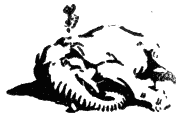
Calm, but white-faced, were they—the men—when in the dawn they came. There were the huge scarred tracks in-leading; there was the door down; there dimly they could see a mass of fur that filled the pen, that heaved in deepest sleep.
Strong ropes, strong chains and bands of steel were at hand, with chloroform, lest he should revive too soon. Through holes in the roof with infinite toil they chained him, bound him—his paws to his neck, his neck and breast and hind legs to a bolted beam. Then raising the door, they dragged him out, not with horses—none would go near—but with a windlass to a tree; and fearing the sleep of death, they let him now revive.
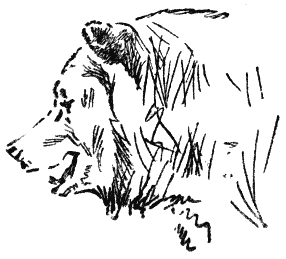
Chained and double chained, frenzied, foaming, and impotent, what words can tell the state of the fallen Monarch? They put him on a sled, and six horses with a long chain drew it by stages to the plain, to the railway. They fed him enough to save his life. A great steam-derrick lifted Bear and beam and chain on to a flat-car, a tarpaulin was spread above his helpless form; the engine puffed, pulled out; and the Grizzly King was gone from his ancient hills.
So they brought him to the great city, the Monarch born, in chains. They put him in a cage not merely strong enough for a lion, but thrice as strong, and once a rope gave way as the huge one strained his bonds. "He is loose," went the cry, and an army of onlookers and keepers fled; only the small man with the calm eye and the big man of the hills were stanch, so the Monarch was still held.
Free in the cage, he swung round, looked this way and that, then heaved his powers against the triple angling steel and wrenched the cage so not a part of it was square. In time he clearly would break out. They dragged the prisoner to another that an elephant could not break down, but it stood on the ground, and in an hour the great beast had a cavern into the earth and was sinking out of sight, till a stream of water sent after him filled the hole and forced him again to view. They moved him to a new cage made for him since he came—a hard rock floor, great bars of nearly two-inch steel that reached up nine feet and then projected in for five. The Monarch wheeled once around, then, rearing, raised his ponderous bulk, wrenched those bars, unbreakable, and bent and turned them in their sockets with one heave till the five-foot spears were pointed out, and then sprang to climb. Nothing but pikes and blazing brands in a dozen ruthless hands could hold him back. The keepers watched him night and day till a stronger cage was made, impregnable with steel above and rocks below.
The Untamed One passed swiftly around, tried every bar, examined every corner, sought for a crack in the rocky floor, and found at last the place where was a six-inch timber beam—the only piece of wood in its frame. It was sheathed in iron, but exposed for an inch its whole length. One claw could reach the wood, and here he lay on his side and raked—raked all day till a great pile of shavings was lying by it and the beam sawn in two; but the cross-bolts remained, and when Monarch put his vast shoulder to the place it yielded not a whit. That was his last hope; now it was gone; and the huge Bear sank down in the cage with his nose in his paws and sobbed—long, heavy sobs, animal sounds indeed, but telling just as truly as in man of the broken spirit—the hope and the life gone out. The keepers came with food at the appointed time, but the Bear moved not. They set it down, but in the morning it was still untouched. The Bear was lying as before, his ponderous form in the pose he had first taken. The sobbing was replaced by a low moan at intervals.
Two days went by. The food, untouched, was corrupting in the sun. The third day, and Monarch still lay on his breast, his huge muzzle under his huger paw. His eyes were hidden; only a slight heaving of his broad chest was now seen.
"He is dying," said one keeper. "He can't live overnight."
"Send for Kellyan," said another.
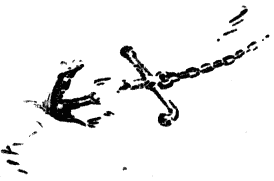
So Kellyan came, slight and thin. There was the beast that he had chained, pining, dying. He had sobbed his life out in his last hope's death, and a thrill of pity came over the hunter, for men of grit and power love grit and power. He put his arm through the cage bars and stroked him, but Monarch made no sign. His body was cold. At length a little moan was sign of life, and Kellyan said, "Here, let me go in to him."
"You are mad," said the keepers, and they would not open the cage. But Kellyan persisted till they put in a cross-grating in front of the Bear. Then, with this between, he approached. His hand was on the shaggy head, but Monarch lay as before. The hunter stroked his victim and spoke to him. His hand went to the big round ears, small above the head. They were rough to his touch. He looked again, then started. What! is it true? Yes, the stranger's tale was true, for both ears were pierced with a round hole—one torn large—and Kellyan knew that once again he had met his little Jack.
"Why, Jacky, I didn't know it was you. I never would have done it if I had known it was you. Jacky, old pard, don't you know me?"
But Jack stirred not, and Kellyan got up quickly. Back to the hotel he flew; there he put on his hunter's suit, smoky and smelling of pine gum and grease, and returned with a mass of honeycomb to reenter the cage.
"Jacky, Jacky!" he cried, "honey, honey!" and he held the tempting comb before him. But Monarch lay as one dead now.

"Jacky, Jacky! don't you know me?" He dropped the honey and laid his hands on the great muzzle.
The voice was forgotten. The old-time invitation, "Honey, Jacky—honey," had lost its power, but the smell of the honey, the coat, the hands that he had fondled, had together a hidden potency.
There is a time when the dying of our race forget their life, but clearly remember the scenes of childhood; these only are real and return with master power. And why not with a Bear? The power of scent was there to call them back again, and Jacky, the Grizzly Monarch, raised his head a little—just a little; the eyes were nearly closed, but the big brown nose was jerked up feebly two or three times—the sign of interest that Jacky used to give in days of old. Now it was Kellyan that broke down even as the Bear had done.
"I didn't know it was you, Jacky, or I never would have done it. Oh, Jacky, forgive me!" He rose and fled from the cage.
The keepers were there. They scarcely understood the scene, but one of them, acting on the hint, pushed the honeycomb nearer and cried, "Honey, Jacky—honey!"
Filled by despair, he had lain down to die, but here was a new-born hope, not clear, not exact as words might put it, but his conqueror had shown himself a friend; this seemed a new hope, and the keeper, taking up the old call, "Honey, Jacky—honey!" pushed the comb till it touched his muzzle. The smell was wafted to his sense, its message reached his brain; hope honored, it must awake response. The great tongue licked the comb, appetite revived, and thus in newborn Hope began the chapter of his gloom.
Skilful keepers were there with plans to meet the Monarch's every want. Delicate foods were offered and every shift was tried to tempt him back to strength and prison life.
He ate and—lived.
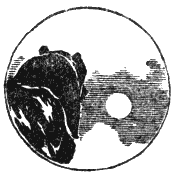
And still he lives, but pacing—pacing—pacing—you may see him, scanning not the crowds, but something beyond the crowds, breaking down at times into petulant rages, but recovering anon his ponderous dignity, looking—waiting—watching—held ever by that Hope, that unknown Hope, that came. Kellyan has been to him since, but Monarch knows him not. Over his head, beyond him, was the great Bear's gaze, far away toward Tallac or far away on the sea, we knowing not which or why, but pacing—pacing—pacing—held like the storied Wandering One to a life of ceaseless journey—a journey aimless, endless, and sad.
The wound-spots long ago have left his shaggy coat, but the earmarks still are there, the ponderous strength, the elephantine dignity. His eyes are dull,—never were bright,—but they seem not vacant, and most often fixed on the Golden Gate where the river seeks the sea.
The river, born in high Sierra's flank, that lived and rolled and grew, through mountain pines, o'erleaping man-made barriers, then to reach with growing power the plains and bring its mighty flood at last to the Bay of Bays, a prisoner there to lie, the prisoner of the Golden Gate, seeking forever Freedom's Blue, seeking and raging—raging and seeking—back and forth, forever—in vain.
